Dissociative Personality Disorder Quotes & Sayings
Enjoy reading and share 74 famous quotes about Dissociative Personality Disorder with everyone.
Top Dissociative Personality Disorder Quotes

Each alter personality had a common goal and raison d'etre, namely my survival. They didn't all realize that though, and so were at odds with each other much of the time. So I continued to be fragmented and divided. — Carolyn Bramhall
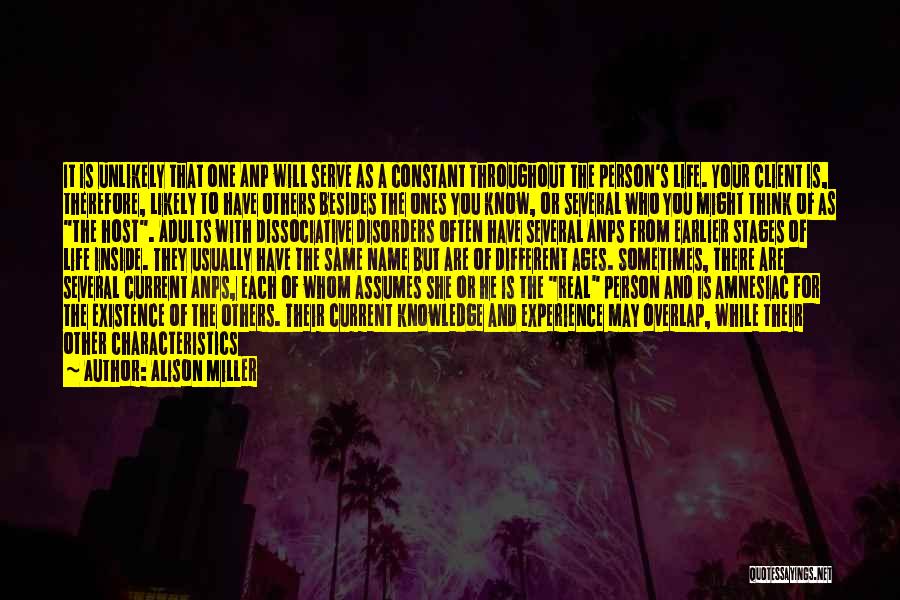
It is unlikely that one ANP will serve as a constant throughout the person's life. Your client is, therefore, likely to have others besides the ones you know, or several who you might think of as "the host". Adults with dissociative disorders often have several ANPs from earlier stages of life inside. They usually have the same name but are of different ages. Sometimes, there are several current ANPs, each of whom assumes she or he is the "real" person and is amnesiac for the existence of the others. Their current knowledge and experience may overlap, while their other characteristics differ somewhat. This makes them glide easily from one to the other, and the therapist can easily miss the switch. p22 — Alison Miller
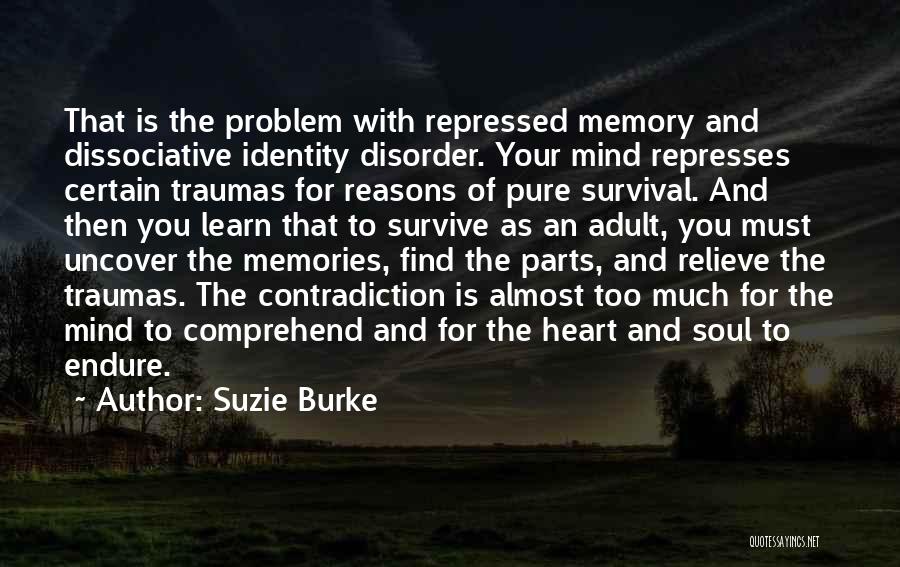
That is the problem with repressed memory and dissociative identity disorder. Your mind represses certain traumas for reasons of pure survival. And then you learn that to survive as an adult, you must uncover the memories, find the parts, and relieve the traumas. The contradiction is almost too much for the mind to comprehend and for the heart and soul to endure. — Suzie Burke

Dear little ones, I know this might be scary and confusing right now, but my name is Jade and I'm here to help. — Jade Miller
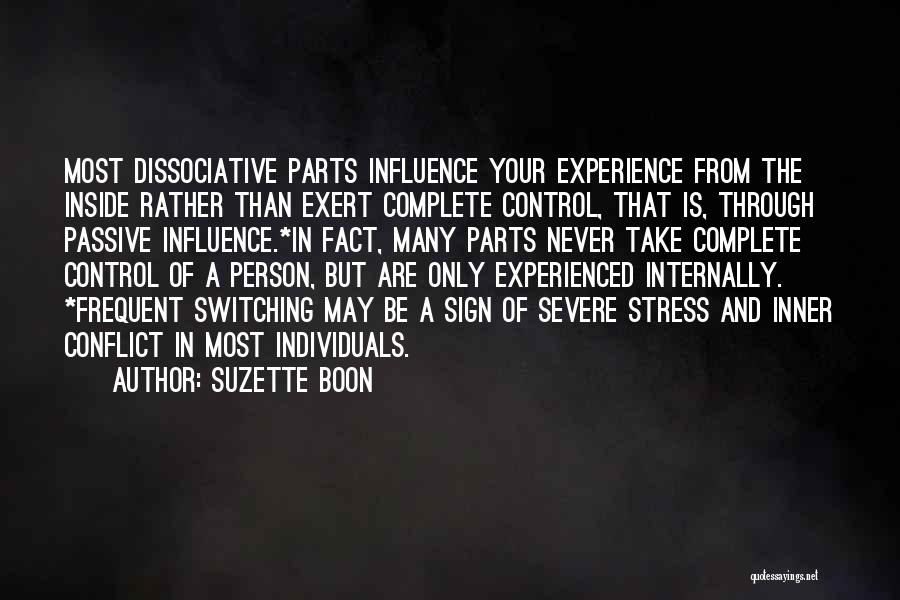
Most dissociative parts influence your experience from the inside rather than exert complete control, that is, through passive influence.
*
In fact, many parts never take complete control of a person, but are only experienced internally.
*
Frequent switching may be a sign of severe stress and inner conflict in most individuals. — Suzette Boon
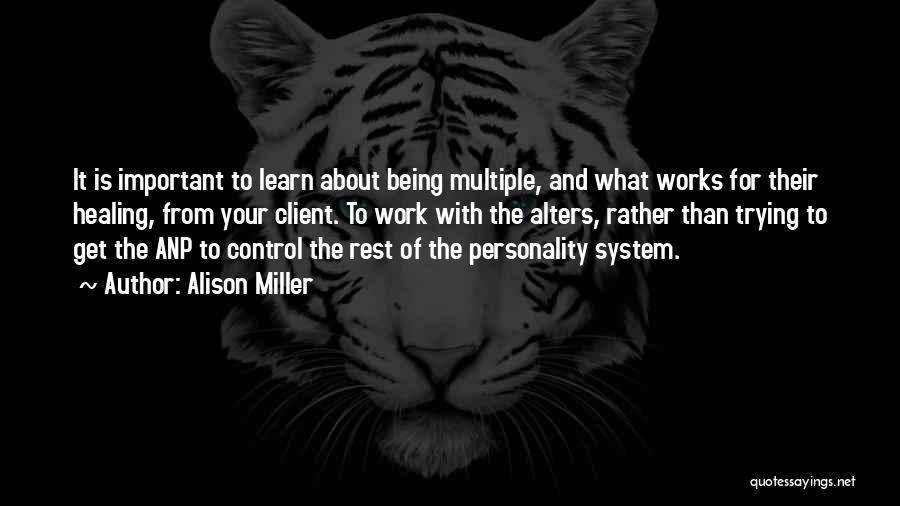
It is important to learn about being multiple, and what works for their healing, from your client. To work with the alters, rather than trying to get the ANP to control the rest of the personality system. — Alison Miller
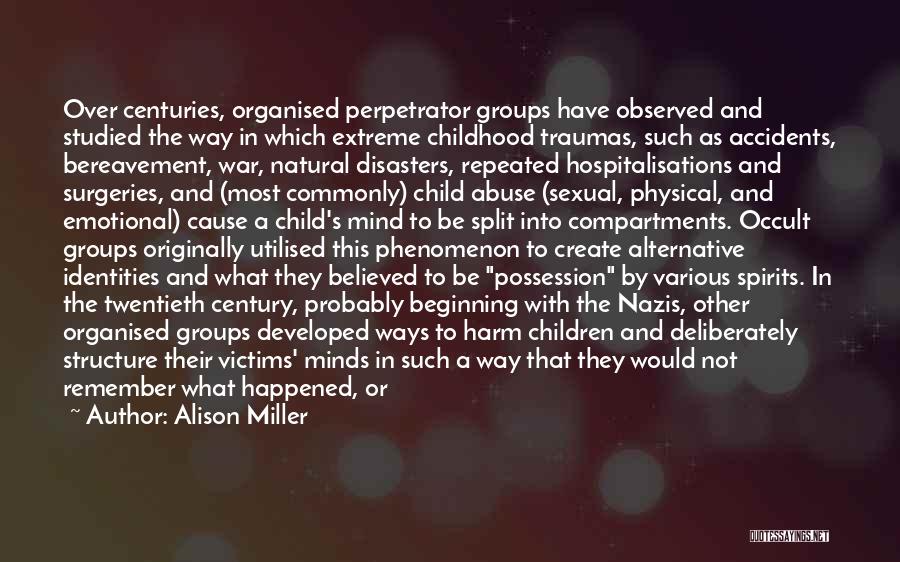
Over centuries, organised perpetrator groups have observed and studied the way in which extreme childhood traumas, such as accidents, bereavement, war, natural disasters, repeated hospitalisations and surgeries, and (most commonly) child abuse (sexual, physical, and emotional) cause a child's mind to be split into compartments. Occult groups originally utilised this phenomenon to create alternative identities and what they believed to be "possession" by various spirits. In the twentieth century, probably beginning with the Nazis, other organised groups developed ways to harm children and deliberately structure their victims' minds in such a way that they would not remember what happened, or that if they began to remember they would disbelieve their own memories. Consequently, the memories of what has happened to a survivor are hidden within his or her inside parts. — Alison Miller
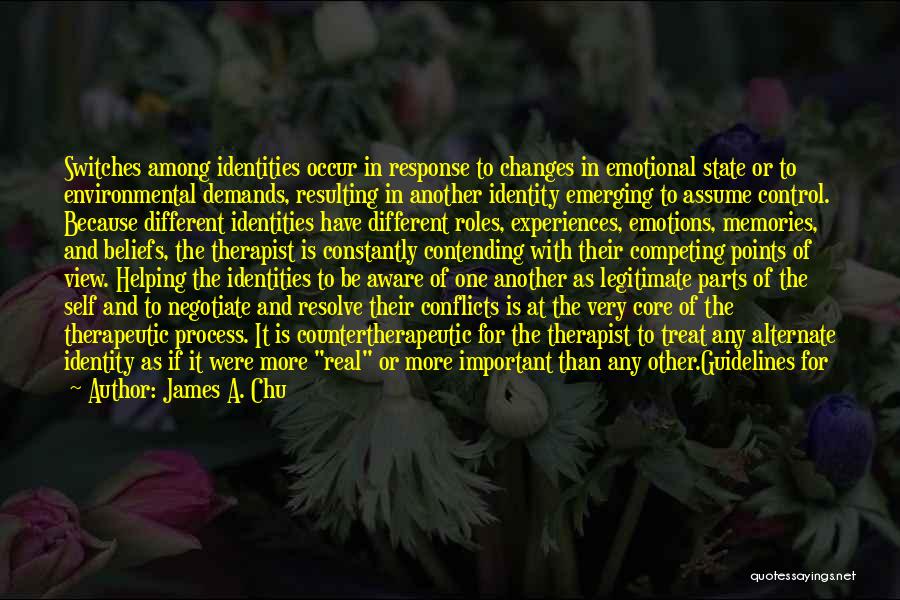
Switches among identities occur in response to changes in emotional state or to environmental demands, resulting in another identity emerging to assume control. Because different identities have different roles, experiences, emotions, memories, and beliefs, the therapist is constantly contending with their competing points of view. Helping the identities to be aware of one another as legitimate parts of the self and to negotiate and resolve their conflicts is at the very core of the therapeutic process. It is countertherapeutic for the therapist to treat any alternate identity as if it were more "real" or more important than any other.
Guidelines for Treating Dissociative Identity Disorder in Adults, Third Revision — James A. Chu

Changes in Relationship with others:
It is especially hard to trust other people if you have been repeatedly abused, abandoned or betrayed as a child. Mistrust makes it very difficult to make friends, and to be able to distinguish between good and bad intentions in other people. Some parts do not seem to trust anyone, while other parts may be so vulnerable and needy that they do not pay attention to clues that perhaps a person is not trustworthy. Some parts like to be close to others or feel a desperate need to be close and taken care of, while other parts fear being close or actively dislike people. Some parts are afraid of being in relationships while others are afraid of being rejected or criticized. This naturally sets up major internal as well as relational conflicts. — Suzette Boon
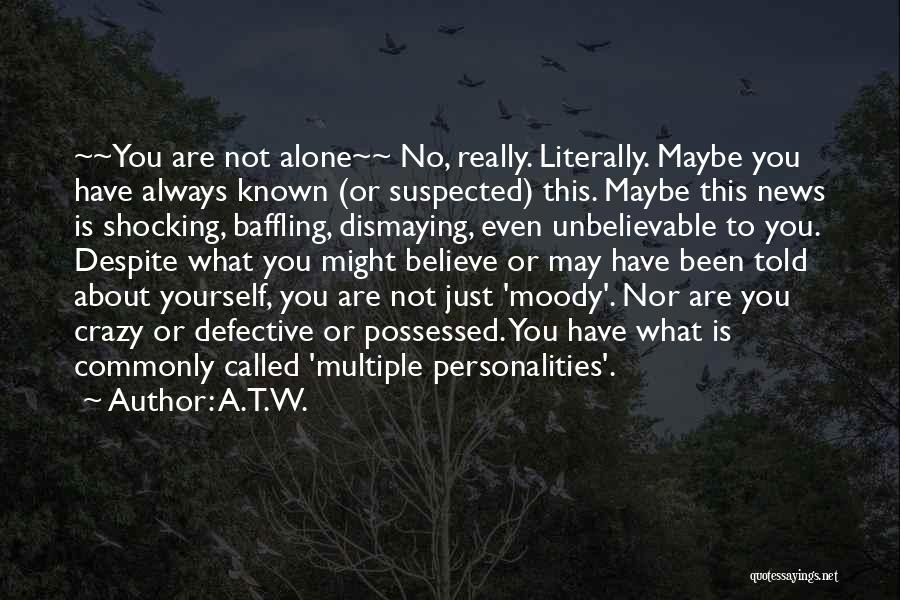
~~You are not alone~~ No, really. Literally. Maybe you have always known (or suspected) this. Maybe this news is shocking, baffling, dismaying, even unbelievable to you. Despite what you might believe or may have been told about yourself, you are not just 'moody'. Nor are you crazy or defective or possessed. You have what is commonly called 'multiple personalities'. — A.T.W.
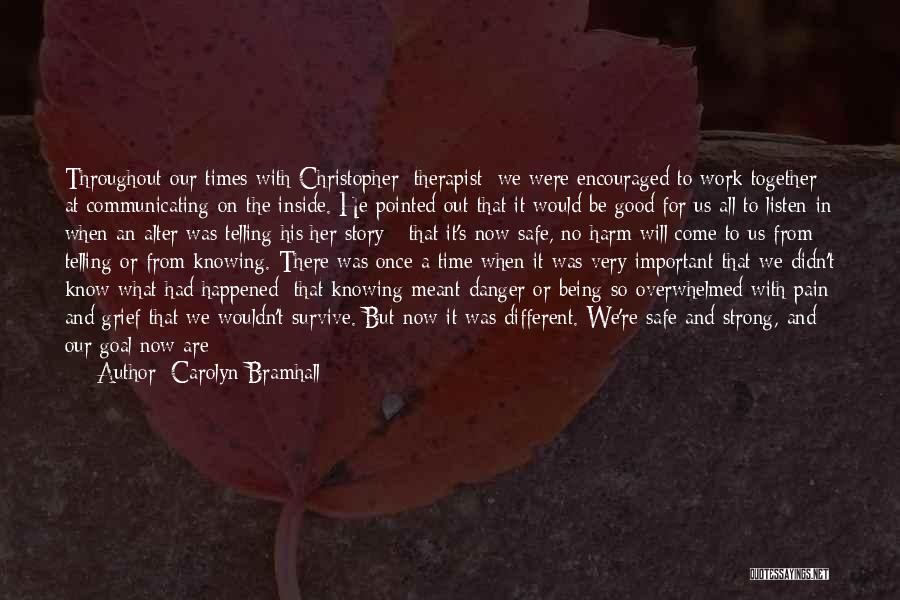
Throughout our times with Christopher [therapist] we were encouraged to work together at communicating on the inside. He pointed out that it would be good for us all to listen-in when an alter was telling his/her story - that it's now safe, no harm will come to us from telling or from knowing. There was once a time when it was very important that we didn't know what had happened; that knowing meant danger or being so overwhelmed with pain and grief that we wouldn't survive. But now it was different. We're safe and strong, and our goal now are to uncover the grisly truth of what's happened to us, so that it's no longer a powerful secret. We can look at it and face the past for what it is - old memories of old events. Today is now,and we can choose to live a different way and believe different things. We were once powerless and vulnerable, but now we were in a position to make choices. We had control over our life. — Carolyn Bramhall
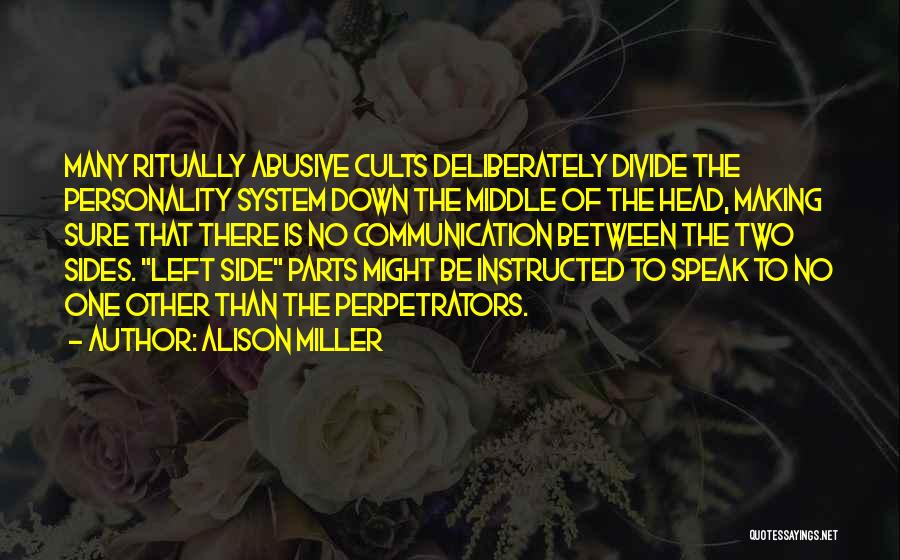
Many ritually abusive cults deliberately divide the personality system down the middle of the head, making sure that there is no communication between the two sides. "Left side" parts might be instructed to speak to no one other than the perpetrators. — Alison Miller
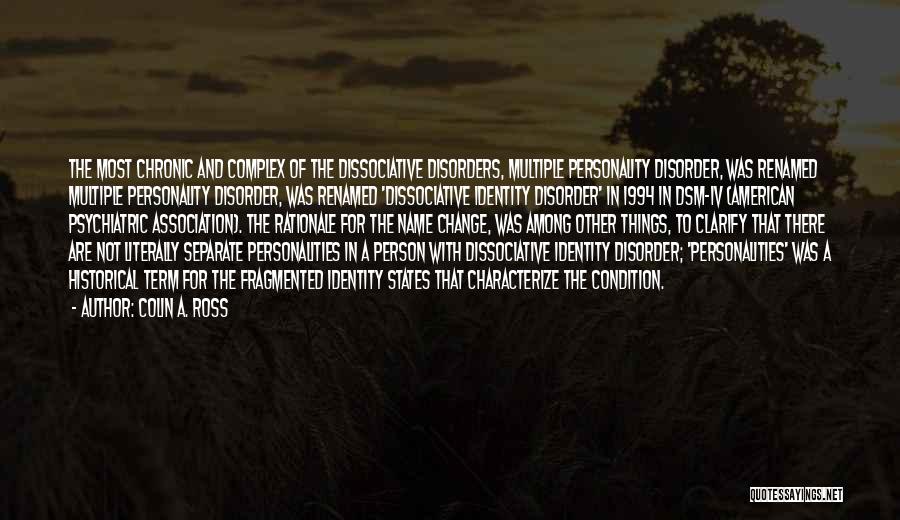
The most chronic and complex of the dissociative disorders, multiple personality disorder, was renamed multiple personality disorder, was renamed 'dissociative identity disorder' in 1994 in DSM-IV (American Psychiatric Association). The rationale for the name change, was among other things, to clarify that there are not literally separate personalities in a person with dissociative identity disorder; 'personalities' was a historical term for the fragmented identity states that characterize the condition. — Colin A. Ross
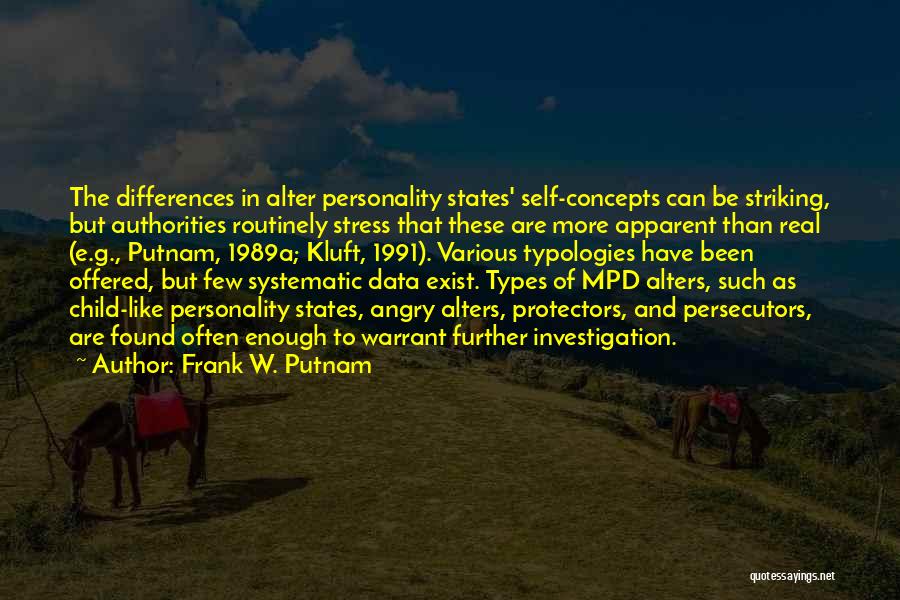
The differences in alter personality states' self-concepts can be striking, but authorities routinely stress that these are more apparent than real (e.g., Putnam, 1989a; Kluft, 1991). Various typologies have been offered, but few systematic data exist. Types of MPD alters, such as child-like personality states, angry alters, protectors, and persecutors, are found often enough to warrant further investigation. — Frank W. Putnam

Joe knew that for some, really for most, the derivations of belladonna that blurred their vision and caused their hearts to race would, as well, hasten their forgetting of detail. They would not recall, not readily, any sense of pain or shame or doubt or threat of danger.
[]
There were always children to be used. Members were obliged to offer their children, although not necessarily every child in a family was used. Some were found to be not suited for the rigor. Some were left alone so that if the involved children in a family were to attempt to tell, siblings could not corroborate their experience. — Judith Spencer
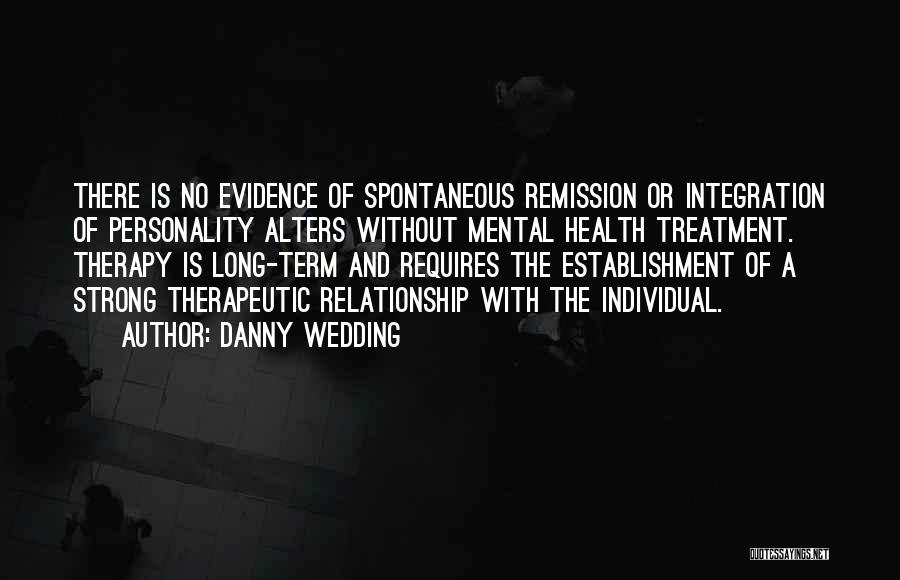
There is no evidence of spontaneous remission or integration of personality alters without mental health treatment. Therapy is long-term and requires the establishment of a strong therapeutic relationship with the individual. — Danny Wedding
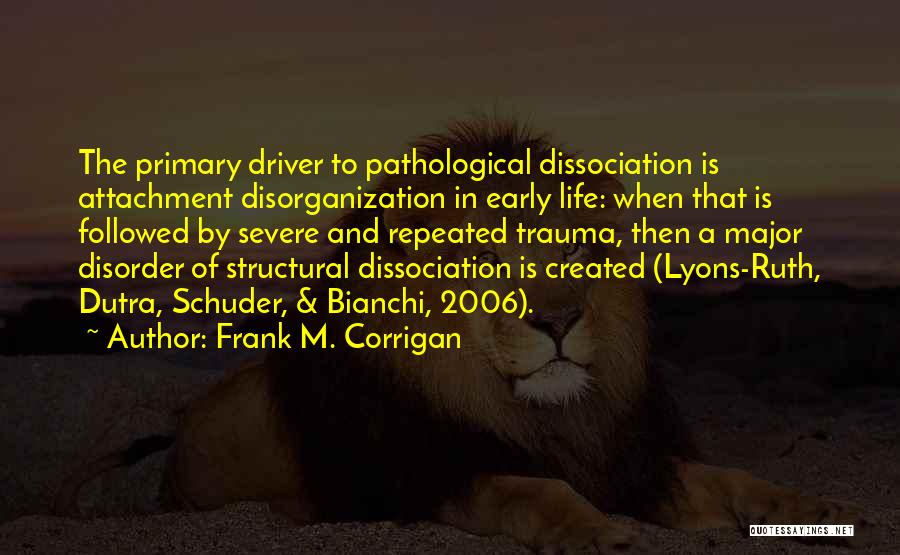
The primary driver to pathological dissociation is attachment disorganization in early life: when that is followed by severe and repeated trauma, then a major disorder of structural dissociation is created (Lyons-Ruth, Dutra, Schuder, & Bianchi, 2006). — Frank M. Corrigan
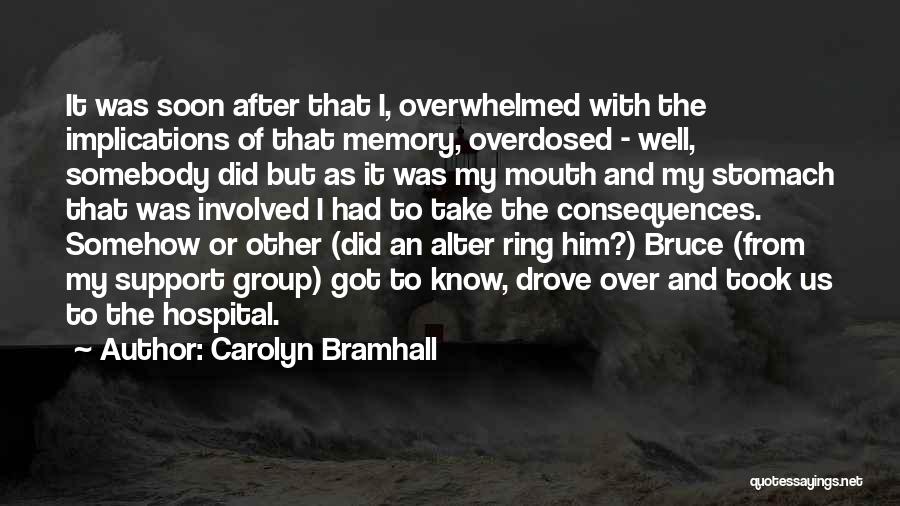
It was soon after that I, overwhelmed with the implications of that memory, overdosed - well, somebody did but as it was my mouth and my stomach that was involved I had to take the consequences. Somehow or other (did an alter ring him?) Bruce (from my support group) got to know, drove over and took us to the hospital. — Carolyn Bramhall
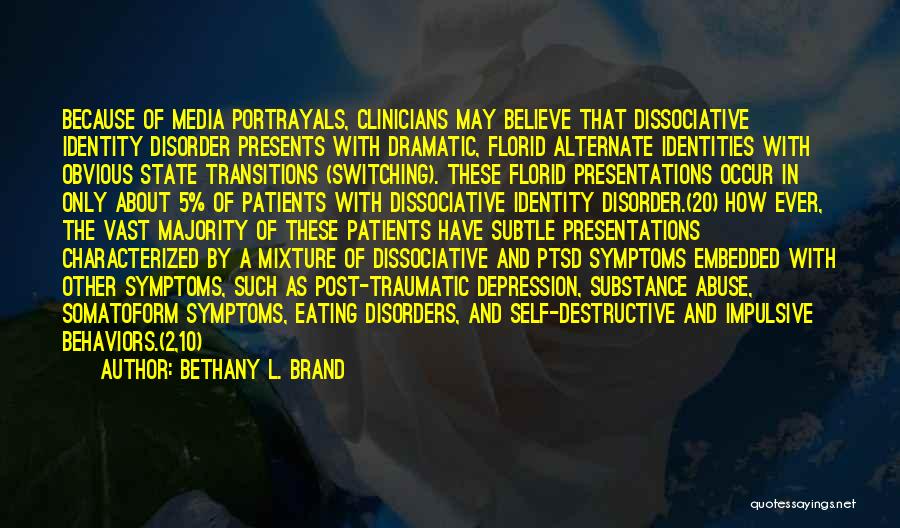
Because of media portrayals, clinicians may believe that dissociative identity disorder presents with dramatic, florid alternate identities with obvious state transitions (switching). These florid presentations occur in only about 5% of patients with dissociative identity disorder.(20) How ever, the vast majority of these patients have subtle presentations characterized by a mixture of dissociative and PTSD symptoms embedded with other symptoms, such as post-traumatic depression, substance abuse, somatoform symptoms, eating disorders, and self-destructive and impulsive behaviors.(2,10) — Bethany L. Brand
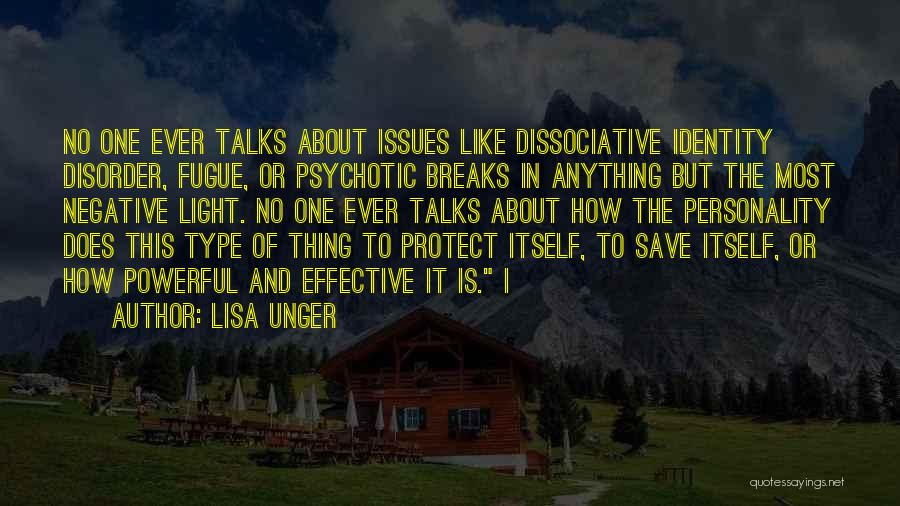
No one ever talks about issues like dissociative identity disorder, fugue, or psychotic breaks in anything but the most negative light. No one ever talks about how the personality does this type of thing to protect itself, to save itself, or how powerful and effective it is." I — Lisa Unger
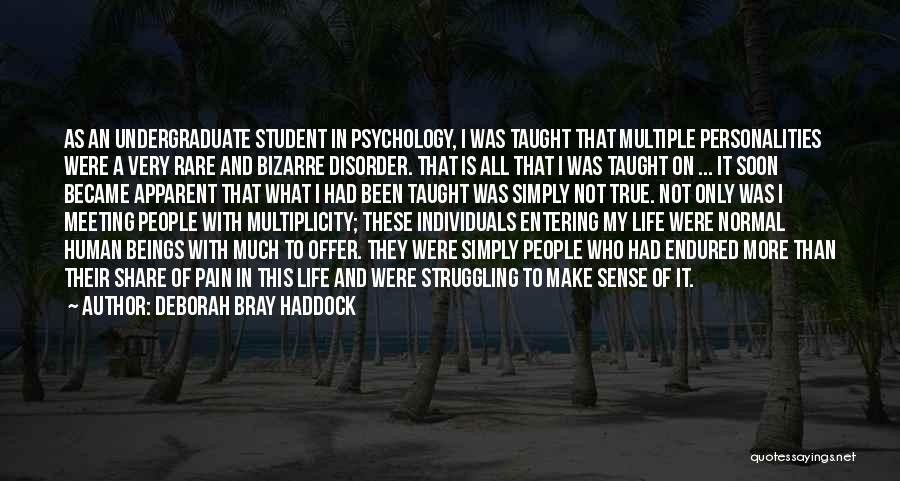
As an undergraduate student in psychology, I was taught that multiple personalities were a very rare and bizarre disorder. That is all that I was taught on ... It soon became apparent that what I had been taught was simply not true. Not only was I meeting people with multiplicity; these individuals entering my life were normal human beings with much to offer. They were simply people who had endured more than their share of pain in this life and were struggling to make sense of it. — Deborah Bray Haddock
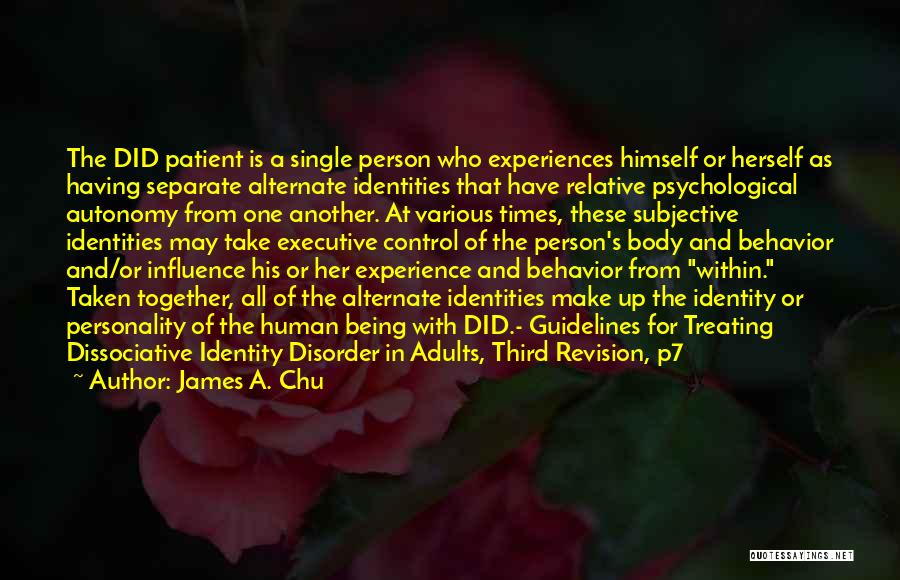
The DID patient is a single person who experiences himself or herself as having separate alternate identities that have relative psychological autonomy from one another. At various times, these subjective identities may take executive control of the person's body and behavior and/or influence his or her experience and behavior from "within." Taken together, all of the alternate identities make up the identity or personality of the human being with DID.
- Guidelines for Treating Dissociative Identity Disorder in Adults, Third Revision, p7 — James A. Chu
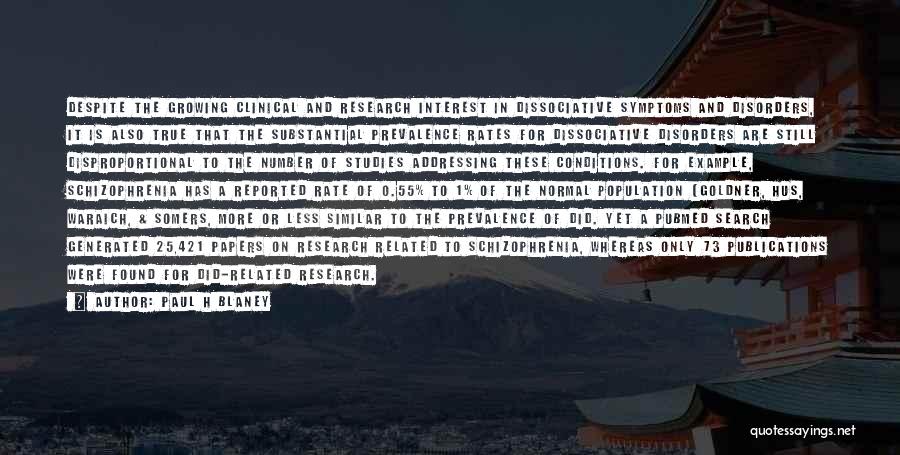
Despite the growing clinical and research interest in dissociative symptoms and disorders, it is also true that the substantial prevalence rates for dissociative disorders are still disproportional to the number of studies addressing these conditions.
For example, schizophrenia has a reported rate of 0.55% to 1% of the normal population (Goldner, Hus, Waraich, & Somers, more or less similar to the prevalence of DID. Yet a PubMed search generated 25,421 papers on research related to schizophrenia, whereas only 73 publications were found for DID-related research. — Paul H Blaney
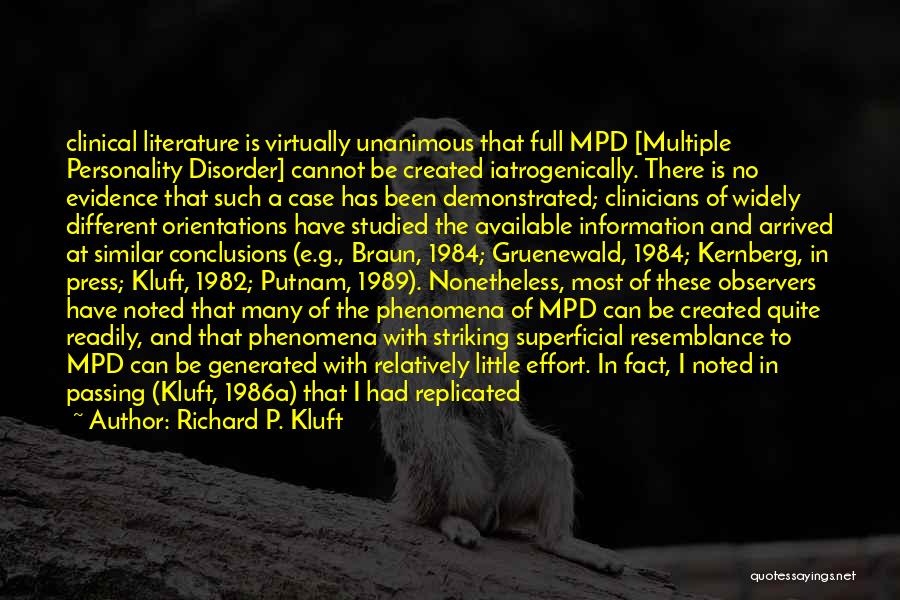
clinical literature is virtually unanimous that full MPD [Multiple Personality Disorder] cannot be created iatrogenically. There is no evidence that such a case has been demonstrated; clinicians of widely different orientations have studied the available information and arrived at similar conclusions (e.g., Braun, 1984; Gruenewald, 1984; Kernberg, in press; Kluft, 1982; Putnam, 1989). Nonetheless, most of these observers have noted that many of the phenomena of MPD can be created quite readily, and that phenomena with striking superficial resemblance to MPD can be generated with relatively little effort. In fact, I noted in passing (Kluft, 1986a) that I had replicated the interventions of Harriman (1942,1943), Leavitt (1947), and Kampman (1976), and found the resultant phenomena clearly distinguishable from clinical MPD.
(from Kluft, R. P. (1989). Dissociation: Vol. 2, No. 2, p. 083-091: Iatrongenic creation of new alter personalities) — Richard P. Kluft
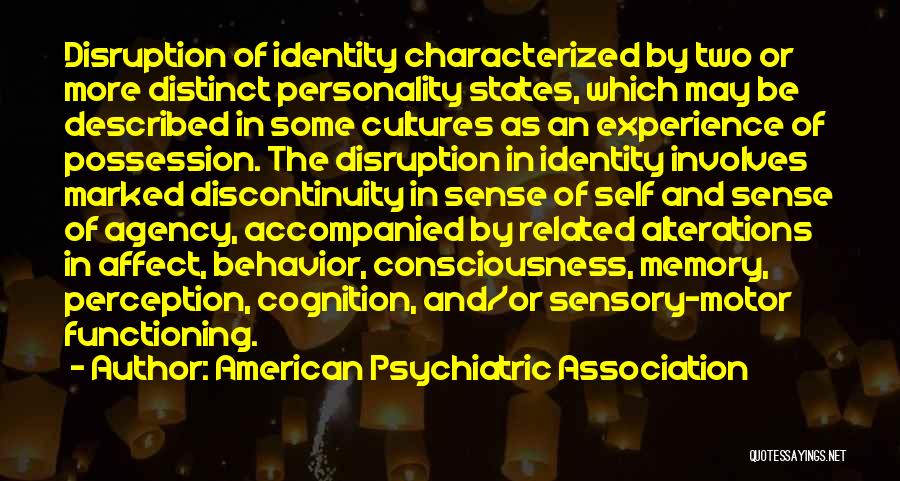
Disruption of identity characterized by two or more distinct personality states, which may be described in some cultures as an experience of possession. The disruption in identity involves marked discontinuity in sense of self and sense of agency, accompanied by related alterations in affect, behavior, consciousness, memory, perception, cognition, and/or sensory-motor functioning. — American Psychiatric Association
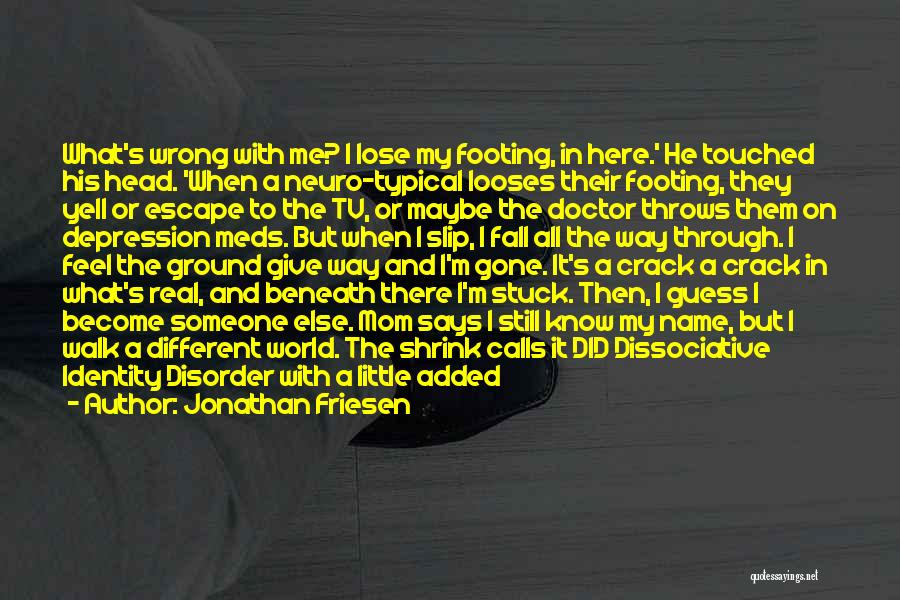
What's wrong with me? I lose my footing, in here.' He touched his head. 'When a neuro-typical looses their footing, they yell or escape to the TV, or maybe the doctor throws them on depression meds. But when I slip, I fall all the way through. I feel the ground give way and I'm gone. It's a crack
a crack in what's real, and beneath there I'm stuck. Then, I guess I become someone else. Mom says I still know my name, but I walk a different world. The shrink calls it DID
Dissociative Identity Disorder
with a little added autism to spice up my other personality. I suppose he's right, but only I know how it feels to slip through the cracks. Then the monster shows up. — Jonathan Friesen
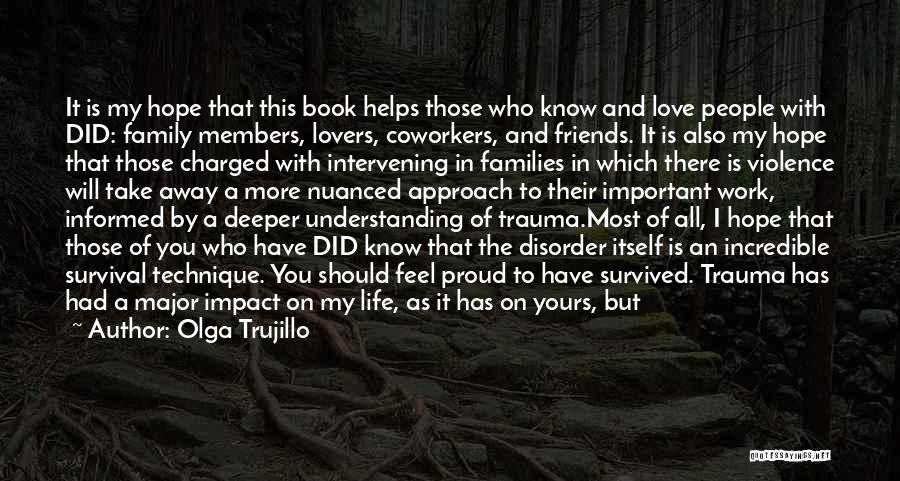
It is my hope that this book helps those who know and love people with DID: family members, lovers, coworkers, and friends. It is also my hope that those charged with intervening in families in which there is violence will take away a more nuanced approach to their important work, informed by a deeper understanding of trauma.
Most of all, I hope that those of you who have DID know that the disorder itself is an incredible survival technique. You should feel proud to have survived. Trauma has had a major impact on my life, as it has on yours, but I've learned that my life extends beyond the pain and darkness. Survivors of trauma are full of life, creativity, courage, and love. We are more than the sum of our parts. — Olga Trujillo
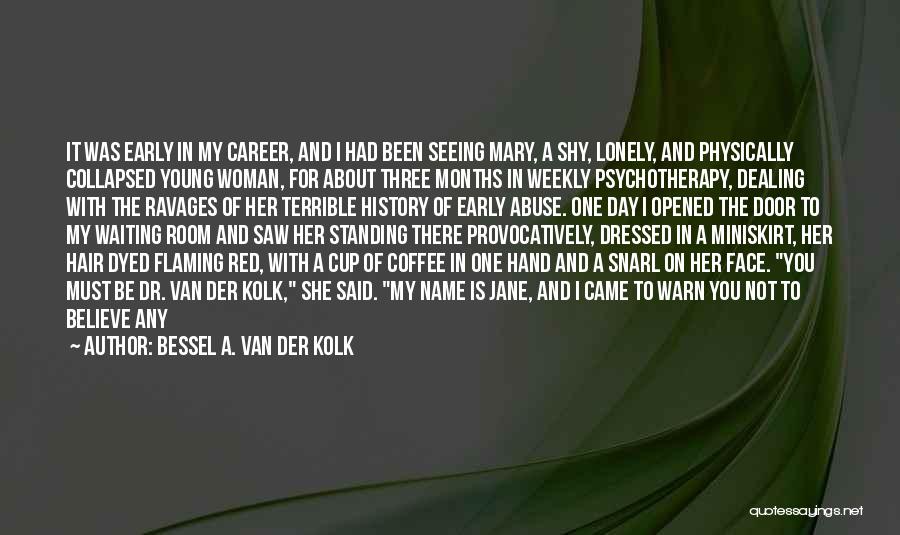
It was early in my career, and I had been seeing Mary, a shy, lonely, and physically collapsed young woman, for about three months in weekly psychotherapy, dealing with the ravages of her terrible history of early abuse. One day I opened the door to my waiting room and saw her standing there provocatively, dressed in a miniskirt, her hair dyed flaming red, with a cup of coffee in one hand and a snarl on her face. "You must be Dr. van der Kolk," she said. "My name is Jane, and I came to warn you not to believe any the lies that Mary has been telling you. Can I come in and tell you about her?" I was stunned but fortunately kept myself from confronting "Jane" and instead heard her out. Over the course of our session I met not only Jane but also a hurt little girl and an angry male adolescent. That was the beginning of a long and productive treatment. — Bessel A. Van Der Kolk
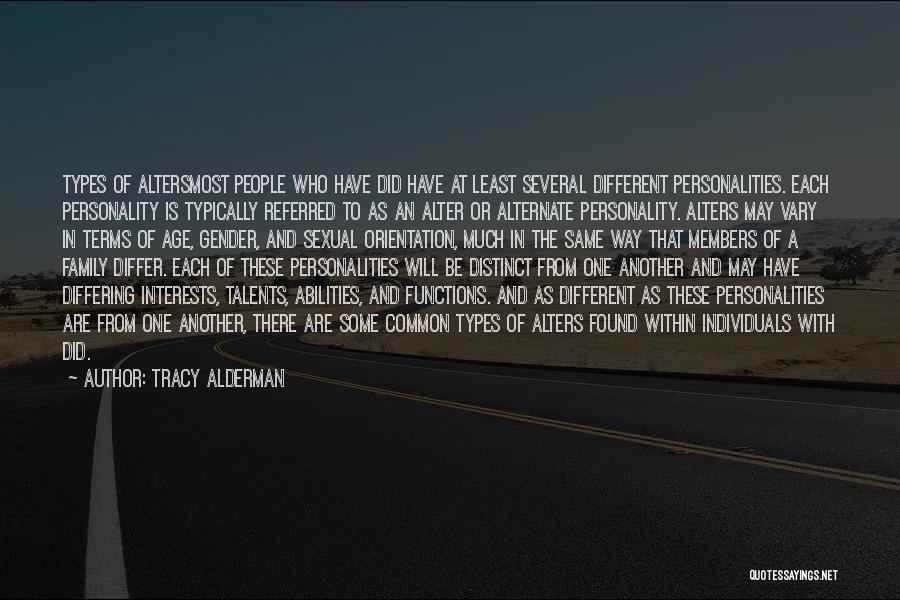
Types of Alters
Most people who have DID have at least several different personalities. Each personality is typically referred to as an alter or alternate personality. Alters may vary in terms of age, gender, and sexual orientation, much in the same way that members of a family differ. Each of these personalities will be distinct from one another and may have differing interests, talents, abilities, and functions. And as different as these personalities are from one another, there are some common types of alters found within individuals with DID. — Tracy Alderman
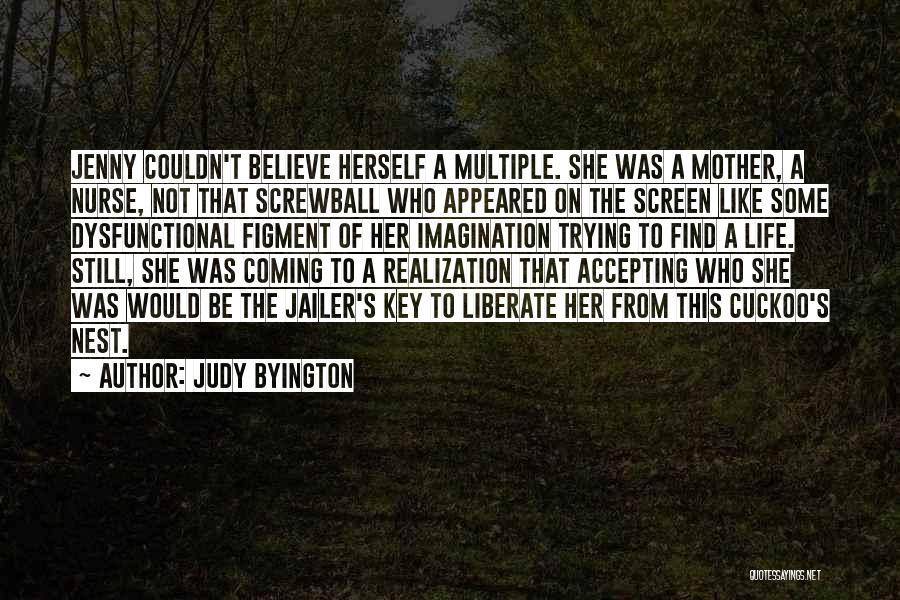
Jenny couldn't believe herself a multiple. She was a mother, a nurse, not that screwball who appeared on the screen like some dysfunctional figment of her imagination trying to find a life. Still, she was coming to a realization that accepting who she was would be the jailer's key to liberate her from this cuckoo's nest. — Judy Byington
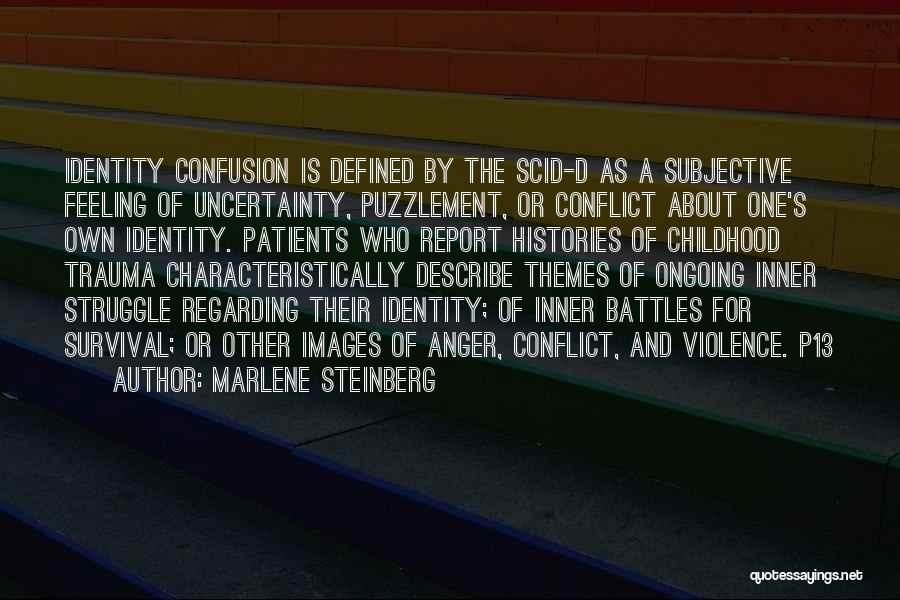
Identity confusion is defined by the SCID-D as a subjective feeling of uncertainty, puzzlement, or conflict about one's own identity. Patients who report histories of childhood trauma characteristically describe themes of ongoing inner struggle regarding their identity; of inner battles for survival; or other images of anger, conflict, and violence. P13 — Marlene Steinberg
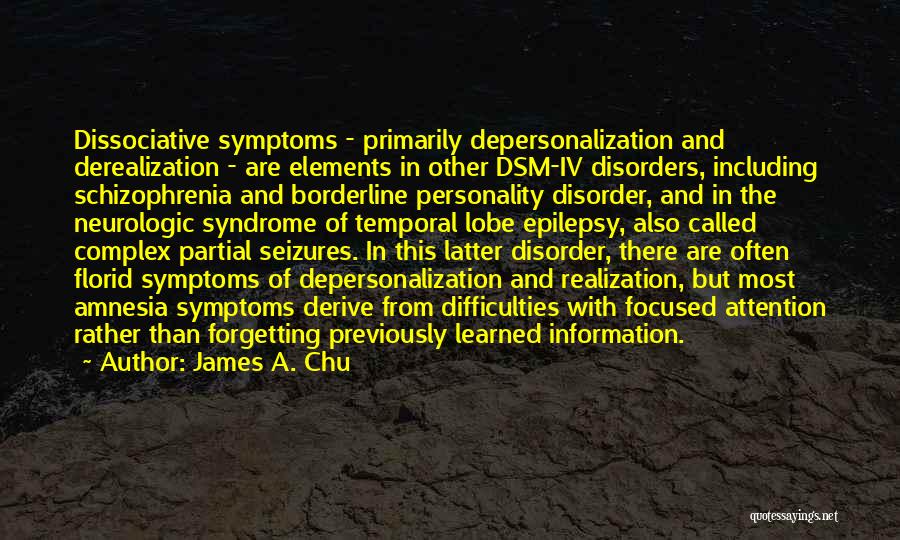
Dissociative symptoms - primarily depersonalization and derealization - are elements in other DSM-IV disorders, including schizophrenia and borderline personality disorder, and in the neurologic syndrome of temporal lobe epilepsy, also called complex partial seizures. In this latter disorder, there are often florid symptoms of depersonalization and realization, but most amnesia symptoms derive from difficulties with focused attention rather than forgetting previously learned information. — James A. Chu
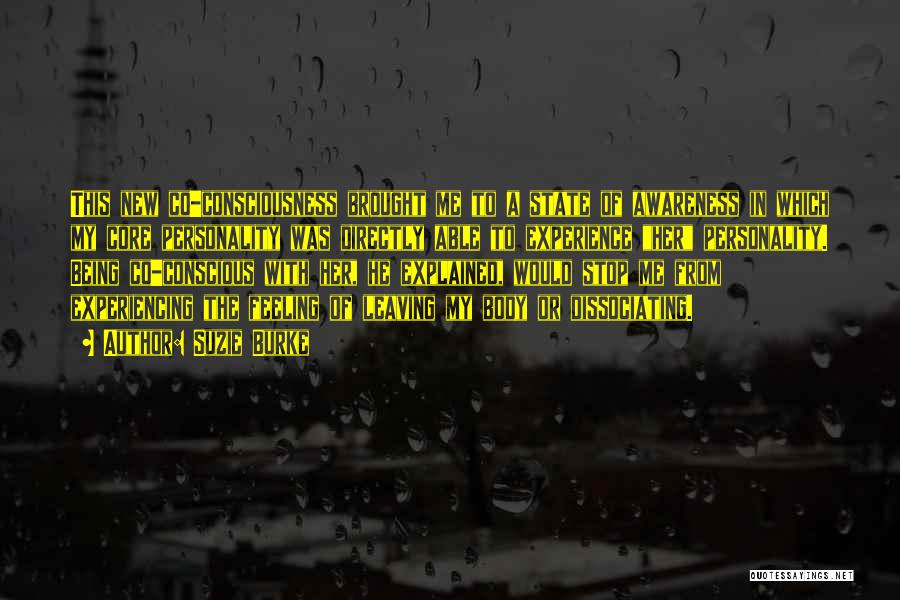
This new co-consciousness brought me to a state of awareness in which my core personality was directly able to experience "her" personality. Being co-conscious with her, he explained, would stop me from experiencing the feeling of leaving my body or dissociating. — Suzie Burke
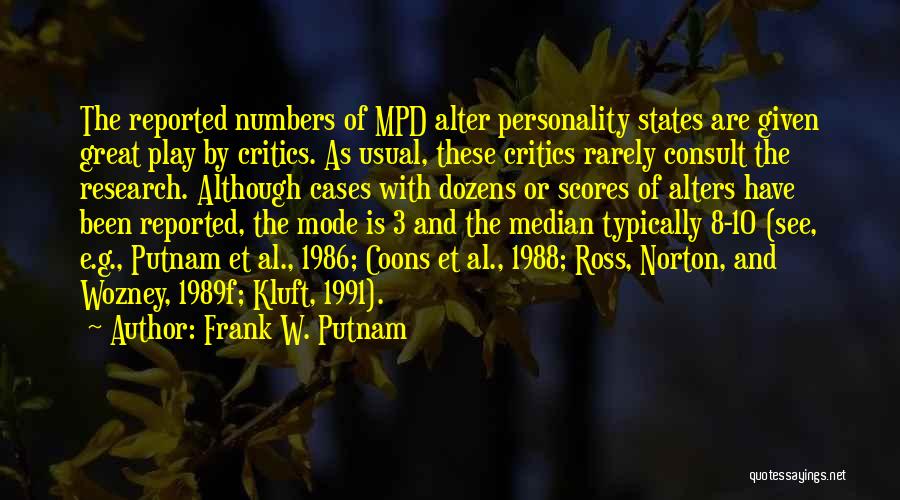
The reported numbers of MPD alter personality states are given great play by critics. As usual, these critics rarely consult the research. Although cases with dozens or scores of alters have been reported, the mode is 3 and the median typically 8-10 (see, e.g., Putnam et al., 1986; Coons et al., 1988; Ross, Norton, and Wozney, 1989f; Kluft, 1991). — Frank W. Putnam
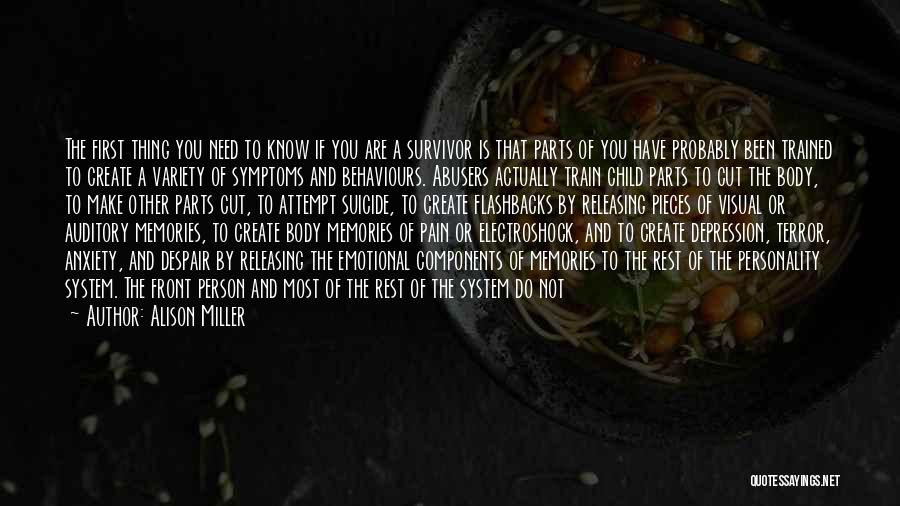
The first thing you need to know if you are a survivor is that parts of you have probably been trained to create a variety of symptoms and behaviours. Abusers actually train child parts to cut the body, to make other parts cut, to attempt suicide, to create flashbacks by releasing pieces of visual or auditory memories, to create body memories of pain or electroshock, and to create depression, terror, anxiety, and despair by releasing the emotional components of memories to the rest of the personality system. The front person and most of the rest of the system do not know that this is the source of these feelings and behaviours. p126 — Alison Miller
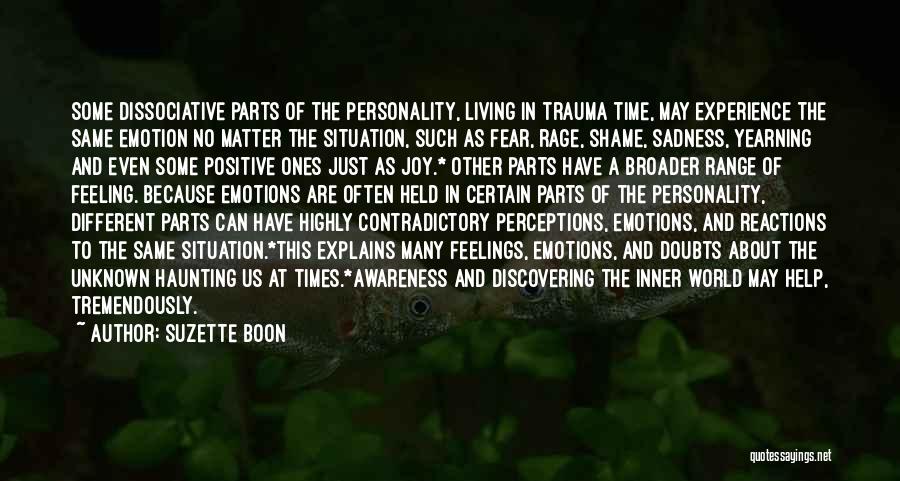
Some dissociative parts of the personality, living in trauma time, may experience the same emotion no matter the situation, such as fear, rage, shame, sadness, yearning and even some positive ones just as joy.
*
Other parts have a broader range of feeling. Because emotions are often held in certain parts of the personality, different parts can have highly contradictory perceptions, emotions, and reactions to the same situation.
*
This explains many feelings, emotions, and doubts about the unknown haunting us at times.
*
Awareness and discovering the inner world may help, tremendously. — Suzette Boon
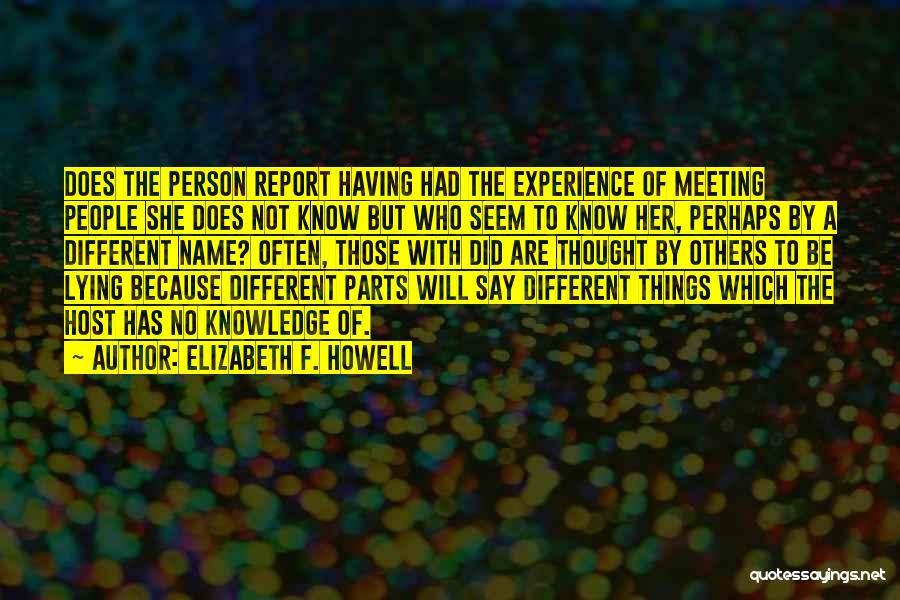
Does the person report having had the experience of meeting people she does not know but who seem to know her, perhaps by a different name? Often, those with DID are thought by others to be lying because different parts will say different things which the host has no knowledge of. — Elizabeth F. Howell
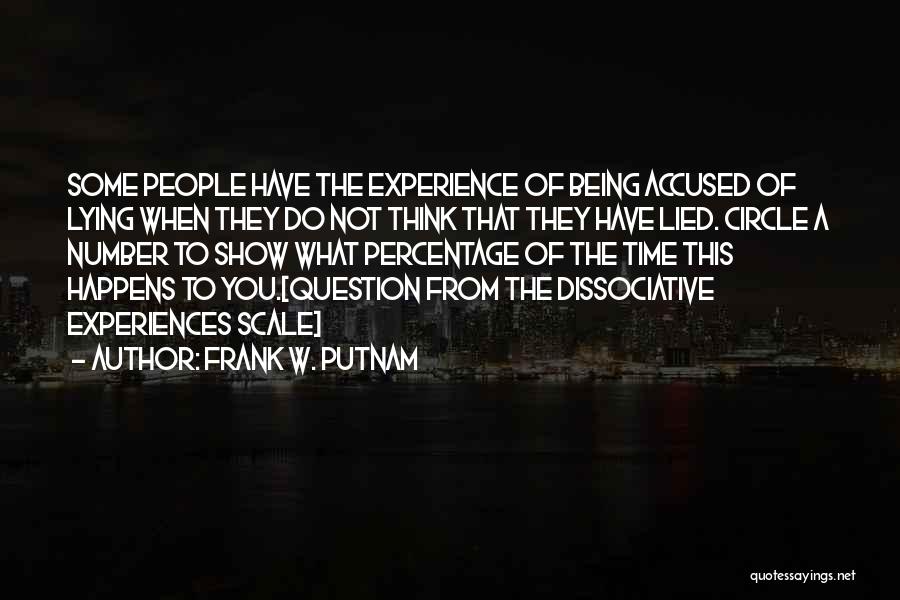
Some people have the experience of being accused of lying when they do not think that they have lied. Circle a number to show what percentage of the time this happens to you.
[question from the Dissociative Experiences Scale] — Frank W. Putnam
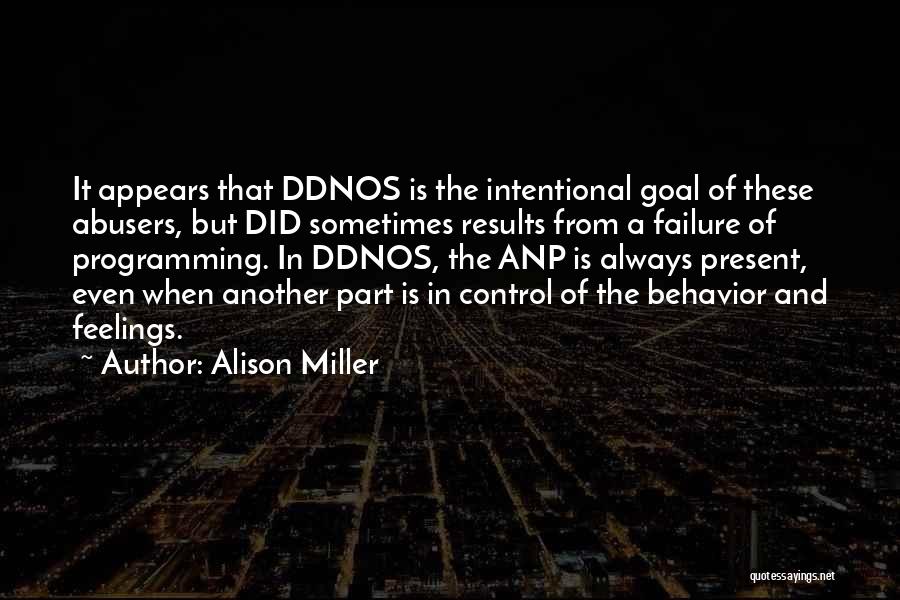
It appears that DDNOS is the intentional goal of these abusers, but DID sometimes results from a failure of programming.
In DDNOS, the ANP is always present, even when another part is in control of the behavior and feelings. — Alison Miller
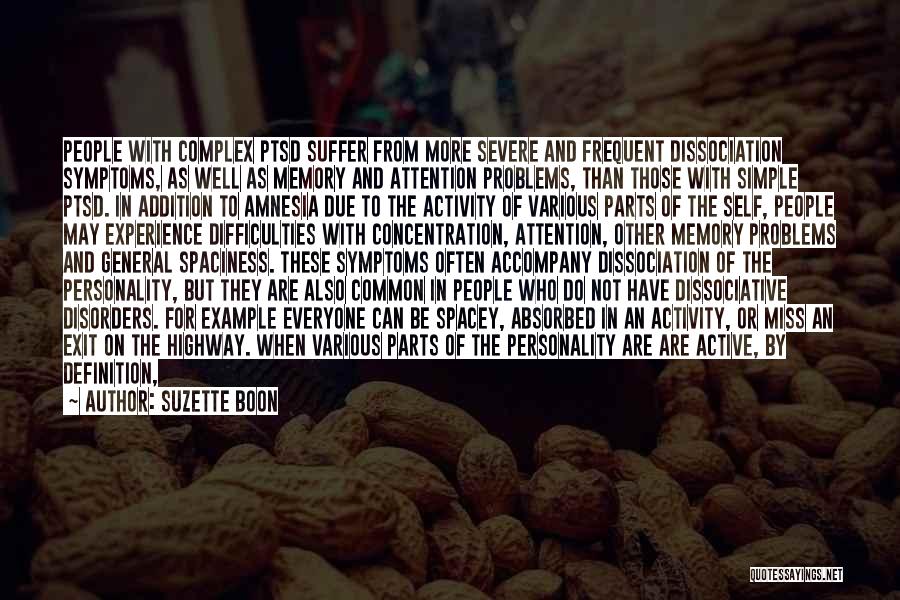
People with Complex PTSD suffer from more severe and frequent dissociation symptoms, as well as memory and attention problems, than those with simple PTSD. In addition to amnesia due to the activity of various parts of the self, people may experience difficulties with concentration, attention, other memory problems and general spaciness. These symptoms often accompany dissociation of the personality, but they are also common in people who do not have dissociative disorders. For example everyone can be spacey, absorbed in an activity, or miss an exit on the highway. When various parts of the personality are are active, by definition, a person experiences some kind of abrupt change in attention and consciousness. — Suzette Boon

Well, it would have been easier if it were put on. But the only ruse of which I'm guilty is to have pretended for so long before coming to you that nothing was wrong. Pretending that the personalities did not exist has now caused me to lose about two days. — Flora Rheta Schreiber
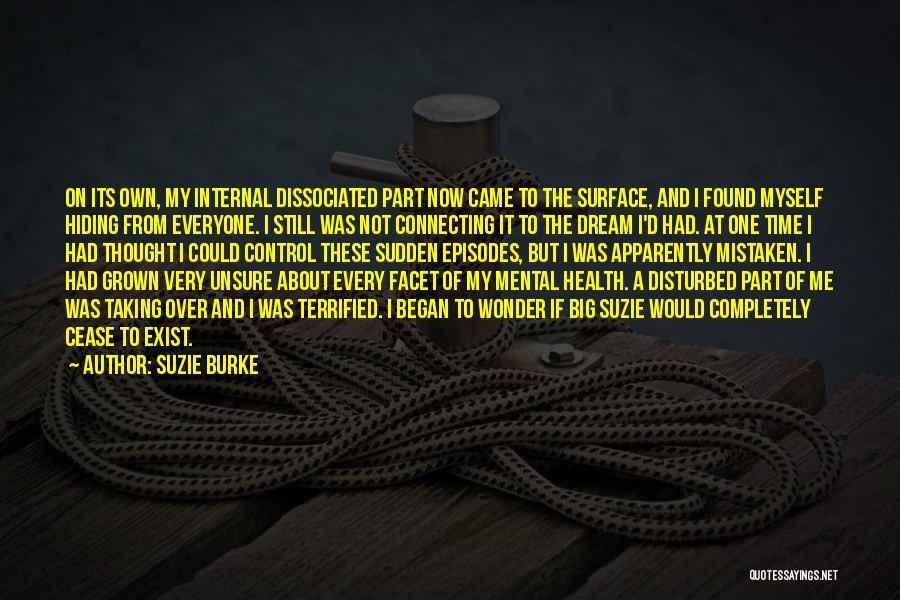
On its own, my internal dissociated part now came to the surface, and I found myself hiding from everyone. I still was not connecting it to the dream I'd had. At one time I had thought I could control these sudden episodes, but I was apparently mistaken. I had grown very unsure about every facet of my mental health. A disturbed part of me was taking over and I was terrified. I began to wonder if Big Suzie would completely cease to exist. — Suzie Burke
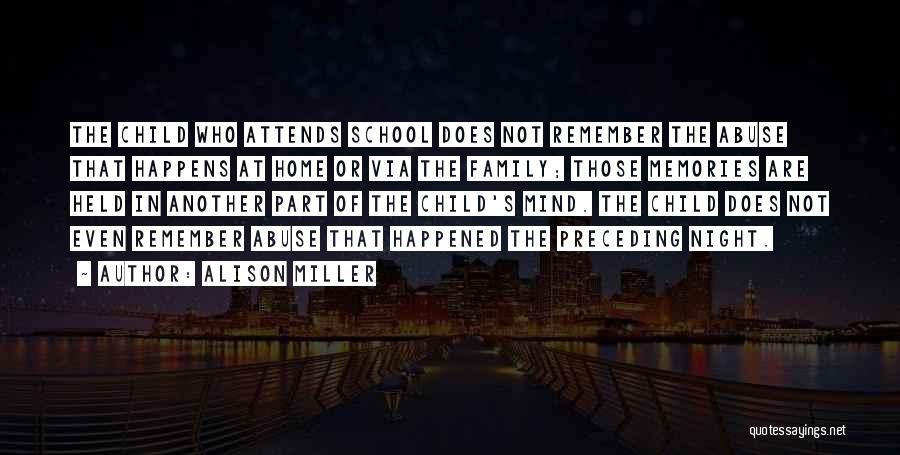
The child who attends school does not remember the abuse that happens at home or via the family; those memories are held in another part of the child's mind. The child does not even remember abuse that happened the preceding night. — Alison Miller
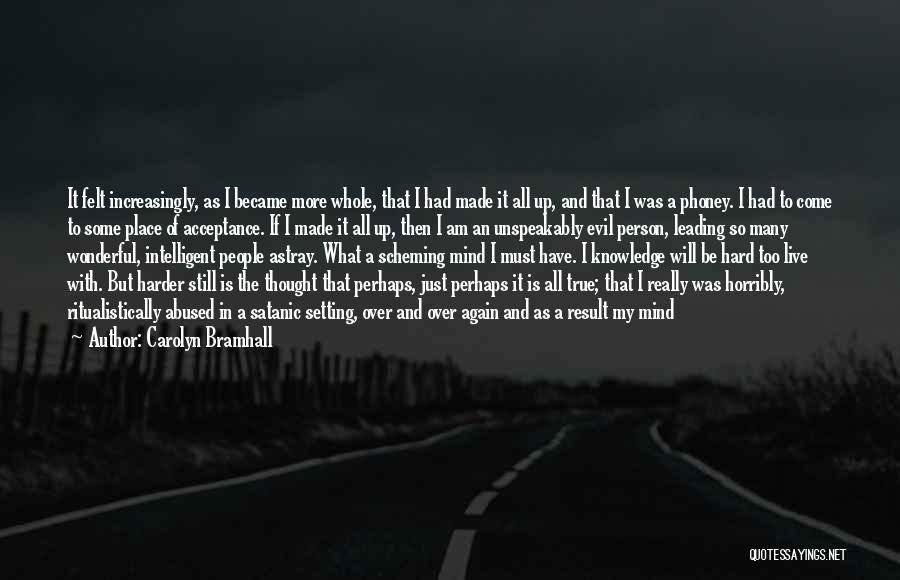
It felt increasingly, as I became more whole, that I had made it all up, and that I was a phoney. I had to come to some place of acceptance. If I made it all up, then I am an unspeakably evil person, leading so many wonderful, intelligent people astray. What a scheming mind I must have. I knowledge will be hard too live with. But harder still is the thought that perhaps, just perhaps it is all true; that I really was horribly, ritualistically abused in a satanic setting, over and over again and as a result my mind fragmented. The implications of that are completely overwhelming. It was me, my body, that they did those things to. No, I would rather believe I am an evil and deceitful person. At least the I can change, and say sorry, and live a better life from now on. — Carolyn Bramhall
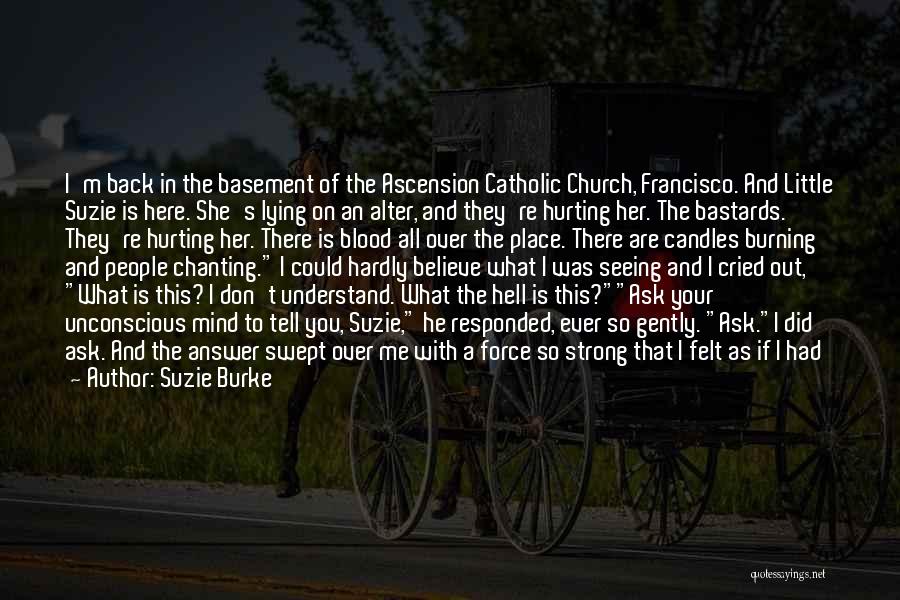
I'm back in the basement of the Ascension Catholic Church, Francisco. And Little Suzie is here. She's lying on an alter, and they're hurting her. The bastards. They're hurting her. There is blood all over the place. There are candles burning and people chanting." I could hardly believe what I was seeing and I cried out, "What is this? I don't understand. What the hell is this?"
"Ask your unconscious mind to tell you, Suzie," he responded, ever so gently. "Ask."
I did ask. And the answer swept over me with a force so strong that I felt as if I had been knocked backward.
"Lord! Oh, Lord. This is satanic ritual abuse, Francisco. That's what this is! That's what this is!" I screamed. "Satanic ritual abuse. And they're using Little Suzie as part of their goddamned ritual.
p150 — Suzie Burke
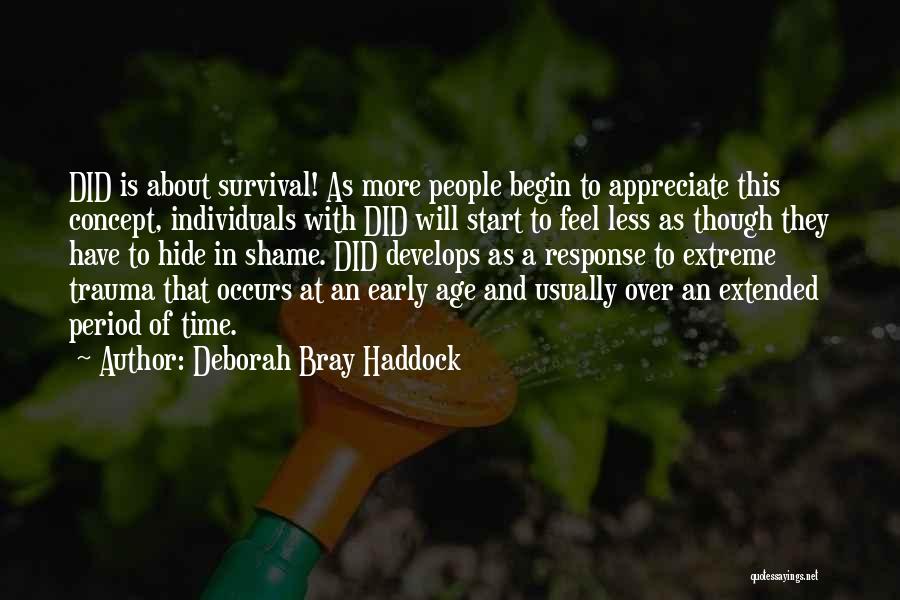
DID is about survival! As more people begin to appreciate this concept, individuals with DID will start to feel less as though they have to hide in shame. DID develops as a response to extreme trauma that occurs at an early age and usually over an extended period of time. — Deborah Bray Haddock
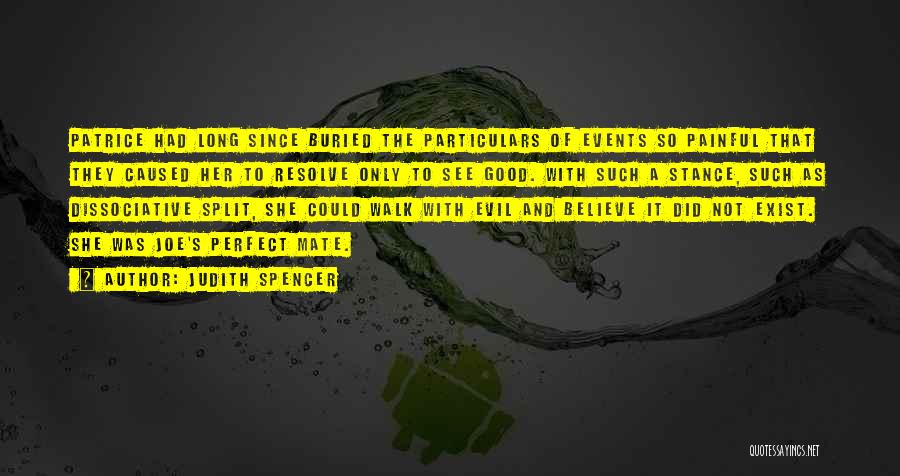
Patrice had long since buried the particulars of events so painful that they caused her to resolve only to see good. With such a stance, such as dissociative split, she could walk with evil and believe it did not exist. She was Joe's perfect mate. — Judith Spencer
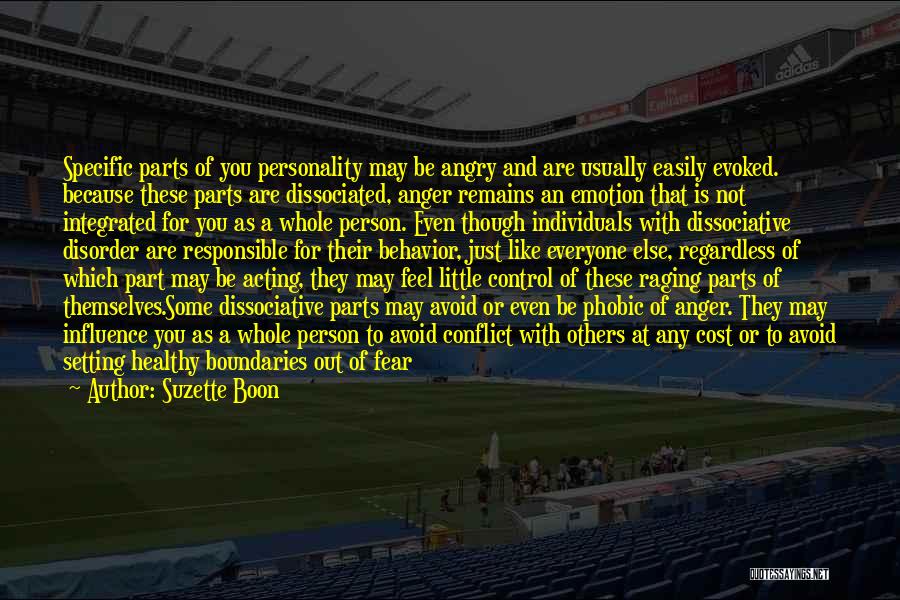
Specific parts of you personality may be angry and are usually easily evoked. because these parts are dissociated, anger remains an emotion that is not integrated for you as a whole person. Even though individuals with dissociative disorder are responsible for their behavior, just like everyone else, regardless of which part may be acting, they may feel little control of these raging parts of themselves.
Some dissociative parts may avoid or even be phobic of anger. They may influence you as a whole person to avoid conflict with others at any cost or to avoid setting healthy boundaries out of fear of someone else's anger; or they may urge you to withdraw from others almost completely. — Suzette Boon
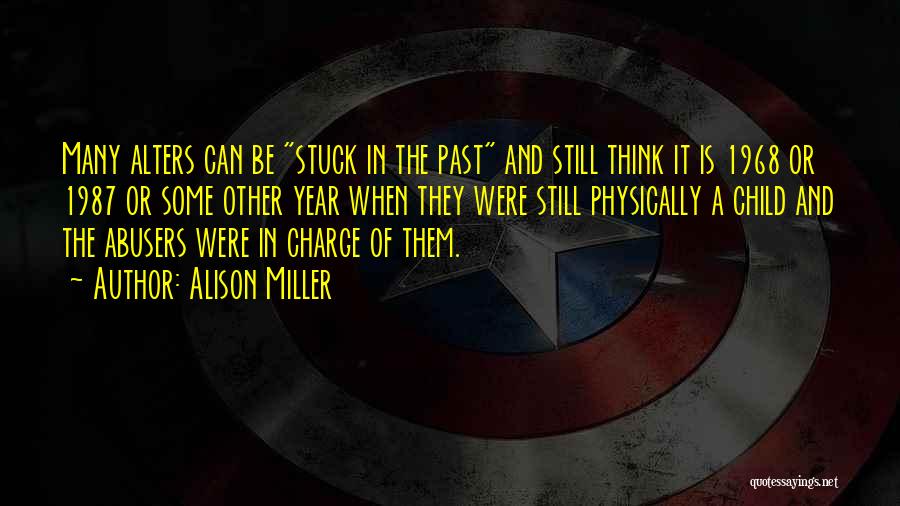
Many alters can be "stuck in the past" and still think it is 1968 or 1987 or some other year when they were still physically a child and the abusers were in charge of them. — Alison Miller

Denial is commonly found among persons with dissociative disorders. My favorite quotation from such a client is, "We are not multiple, we made it all up." I have heard this from several different clients. When I hear it, I politely inquire, "And who is we? — Alison Miller
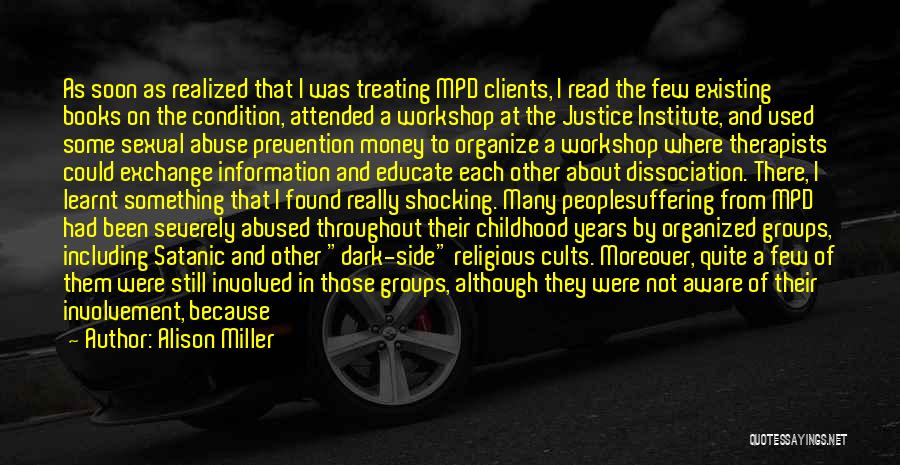
As soon as realized that I was treating MPD clients, I read the few existing books on the condition, attended a workshop at the Justice Institute, and used some sexual abuse prevention money to organize a workshop where therapists could exchange information and educate each other about dissociation. There, I learnt something that I found really shocking. Many people
suffering from MPD had been severely abused throughout their childhood years by organized groups, including Satanic and other "dark-side" religious cults. Moreover, quite a few of them were still involved in those groups, although they were not aware of their involvement, because it was other "personalities" - dissociated parts of them - who went off to the groups' rituals. I was skeptical, to say the least. — Alison Miller
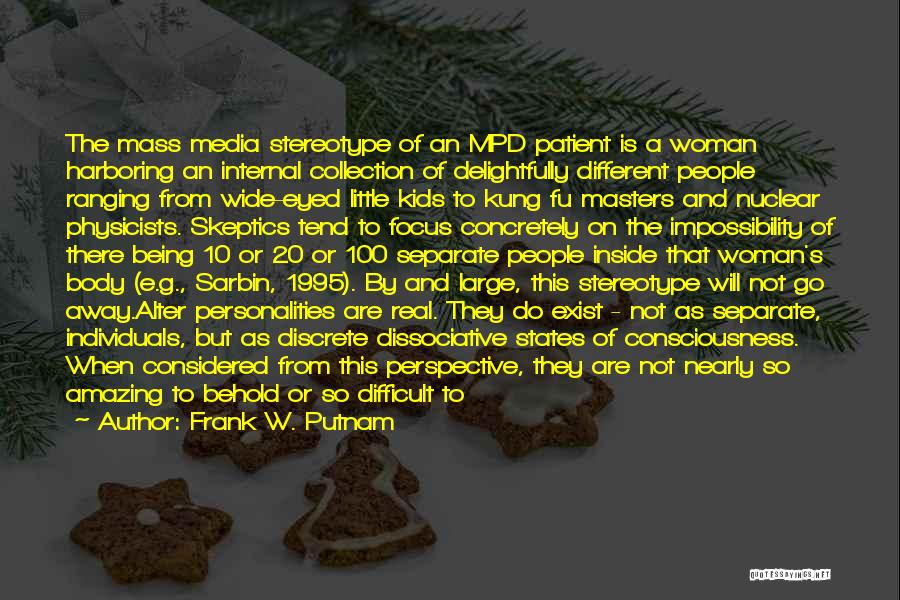
The mass media stereotype of an MPD patient is a woman harboring an internal collection of delightfully different people ranging from wide-eyed little kids to kung fu masters and nuclear physicists. Skeptics tend to focus concretely on the impossibility of there being 10 or 20 or 100 separate people inside that woman's body (e.g., Sarbin, 1995). By and large, this stereotype will not go away.
Alter personalities are real. They do exist - not as separate, individuals, but as discrete dissociative states of consciousness. When considered from this perspective, they are not nearly so amazing to behold or so difficult to accept. A fair reading of the MPD literature shows that authorities have long subscribed to this thesis: "Only when taken together can all of the personality states be considered a whole personality" (Coons, 1984, p. 53). Paradoxically, it is the critics who implicitly accept the view that the alter personalities are separate people. — Frank W. Putnam
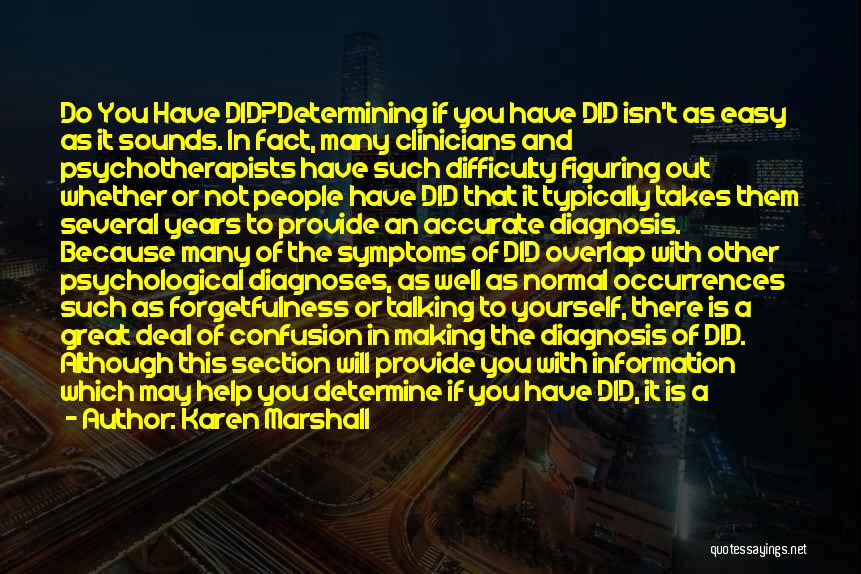
Do You Have DID?
Determining if you have DID isn't as easy as it sounds. In fact, many clinicians and psychotherapists have such difficulty figuring out whether or not people have DID that it typically takes them several years to provide an accurate diagnosis. Because many of the symptoms of DID overlap with other psychological diagnoses, as well as normal occurrences such as forgetfulness or talking to yourself, there is a great deal of confusion in making the diagnosis of DID. Although this section will provide you with information which may help you determine if you have DID, it is a good idea to consult with a professional in the mental health field so that you can have further confirmation of your findings. — Karen Marshall

Shortly after I began work with Teresa, I acquired another MPD client, a supposedly schizophrenic young man I will call Tony. He called in to the clinic on a day I was on telephone duty, saying he was having flashbacks of "ritual abuse." I did not yet know what that was. Tony became my client. He could be quite entertaining. I have a vivid memory of him as a three-year-old, "Tiny Tony," standing on his head on my office couch, and running down the hall to try unsuccessfully to make it to the bathroom. He had in his head the entire rock band of Guns'n'Roses, and I got to know Axl, the band leader, quite well. I remember the time Tony was in hospital and I went to visit him; Axl popped out and said, "Remember, we're schizophrenic in here! — Alison Miller
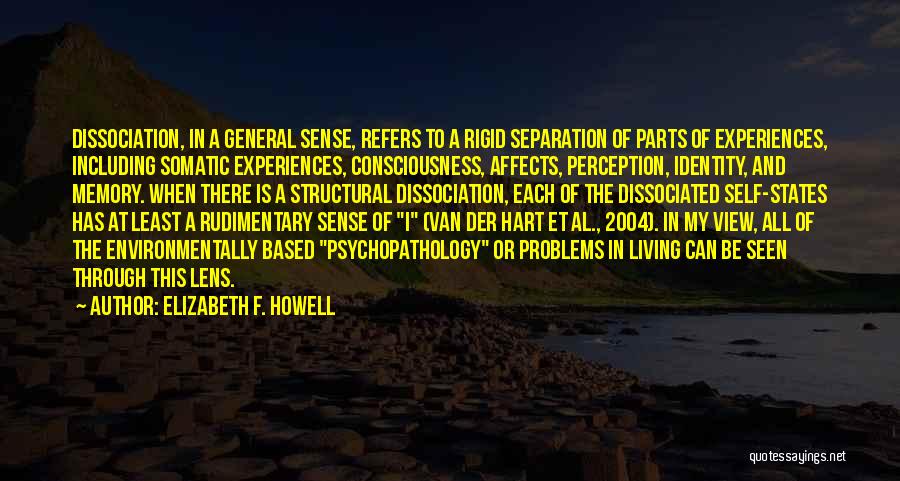
Dissociation, in a general sense, refers to a rigid separation of parts of experiences, including somatic experiences, consciousness, affects, perception, identity, and memory. When there is a structural dissociation, each of the dissociated self-states has at least a rudimentary sense of "I" (Van der Hart et al., 2004). In my view, all of the environmentally based "psychopathology" or problems in living can be seen through this lens. — Elizabeth F. Howell
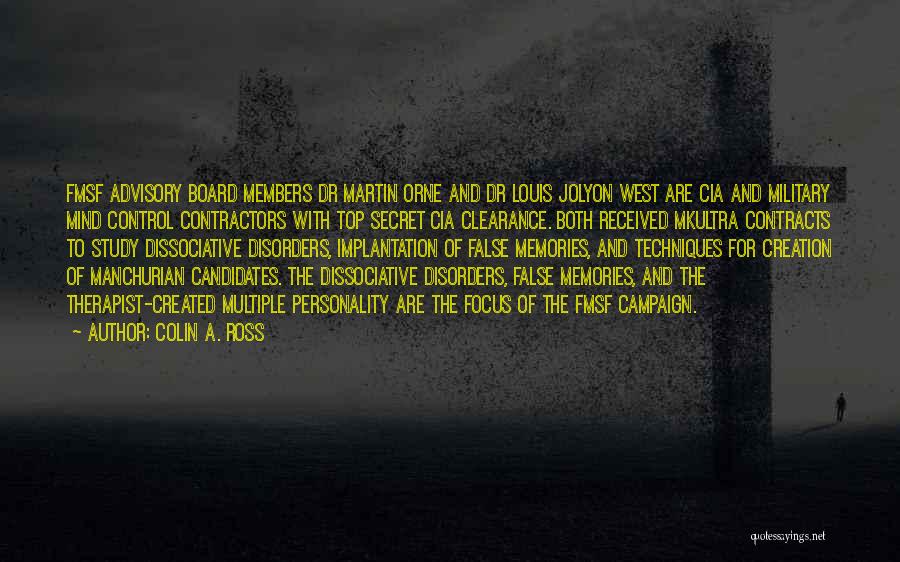
FMSF Advisory Board Members Dr Martin Orne and Dr Louis Jolyon West are CIA and military mind control contractors with TOP SECRET CIA clearance. Both received MKULTRA contracts to study dissociative disorders, implantation of false memories, and techniques for creation of Manchurian Candidates. The dissociative disorders, false memories, and the therapist-created multiple personality are the focus of the FMSF campaign. — Colin A. Ross
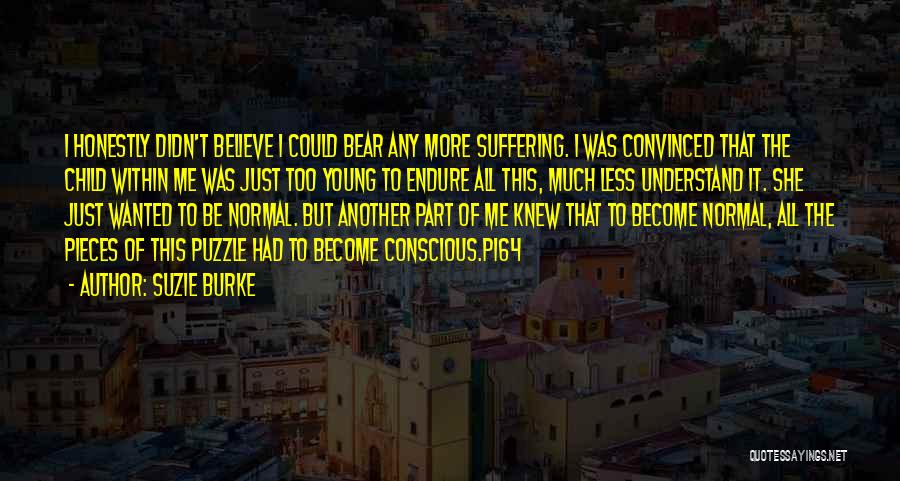
I honestly didn't believe I could bear any more suffering. I was convinced that the child within me was just too young to endure all this, much less understand it. She just wanted to be normal. But another part of me knew that to become normal, all the pieces of this puzzle had to become conscious.
p164 — Suzie Burke

Interestingly, the patients who presented to me self-diagnosed [with Dissociative Identity Disorder had tried to tell previous therapists of their plight, but had been disbelieved. These therapists had used fallacious "capricious criteria" (KIuft, 1988) to discredit the diagnosis; e.g., that the patient could not possibly have MPD because she was aware of the other alters [sic!]. — Richard P. Kluft
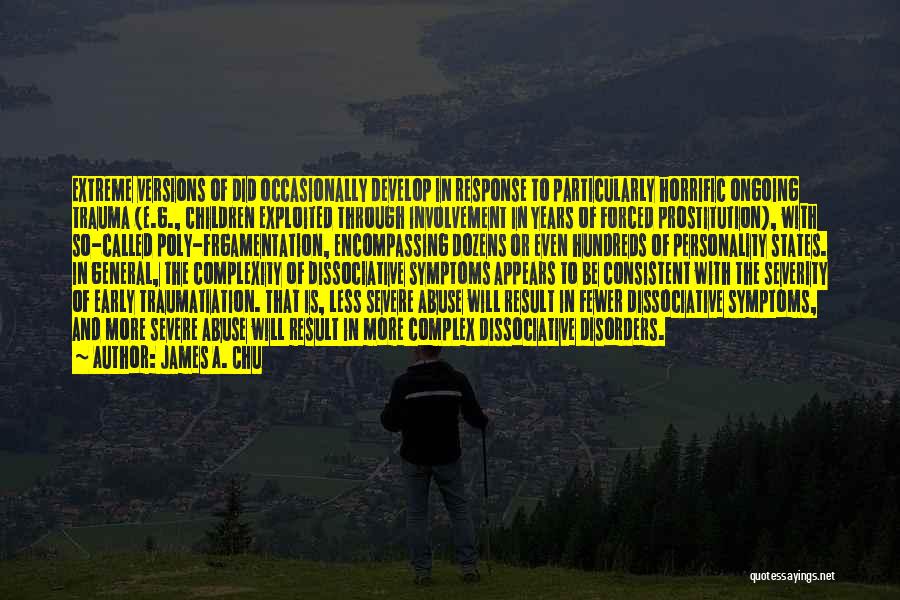
Extreme versions of DID occasionally develop in response to particularly horrific ongoing trauma (e.g., children exploited through involvement in years of forced prostitution), with so-called poly-frgamentation, encompassing dozens or even hundreds of personality states. In general, the complexity of dissociative symptoms appears to be consistent with the severity of early traumatiation. That is, less severe abuse will result in fewer dissociative symptoms, and more severe abuse will result in more complex dissociative disorders. — James A. Chu
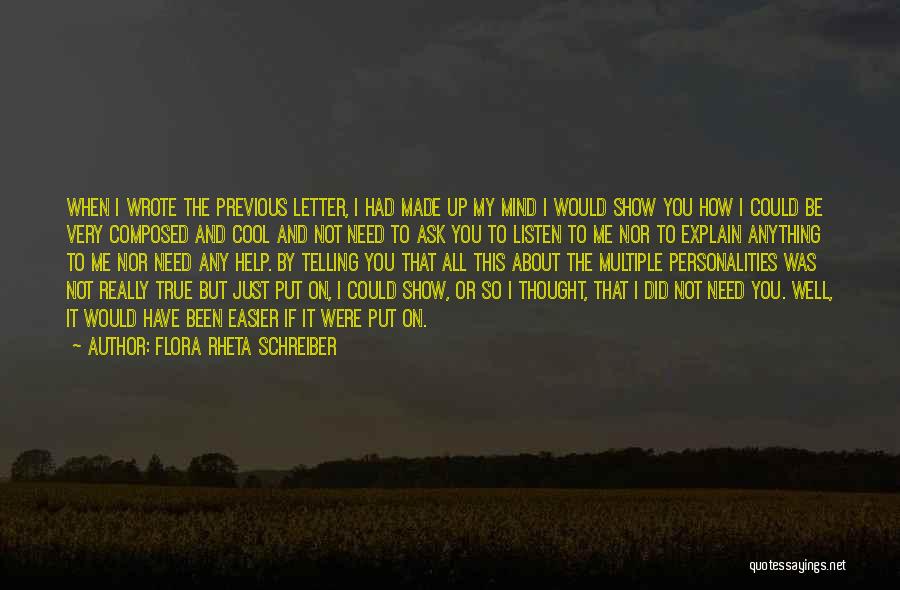
When I wrote the previous letter, I had made up my mind I would show you how I could be very composed and cool and not need to ask you to listen to me nor to explain anything to me nor need any help. By telling you that all this about the multiple personalities was not really true but just put on, I could show, or so I thought, that I did not need you. Well, it would have been easier if it were put on. — Flora Rheta Schreiber
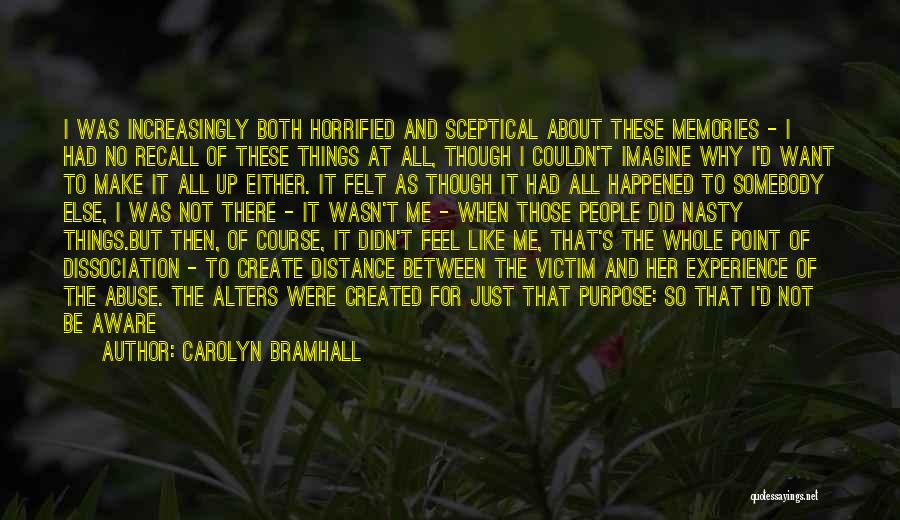
I was increasingly both horrified and sceptical about these memories - I had no recall of these things at all, though I couldn't imagine why I'd want to make it all up either. It felt as though it had all happened to somebody else, I was not there - it wasn't me - when those people did nasty things.
But then, of course, it didn't feel like me, that's the whole point of dissociation - to create distance between the victim and her experience of the abuse. The alters were created for just that purpose: so that I'd not be aware that it happened to me, but rather to "others". The trouble is, in reality it was my body that took the abuse. It was only my mind that was divided, and sooner or later the amnesic barriers were bound to come down.
And that's exactly what had begun to happen as I heard their stories. They triggered a vague and growing sense in me that this really is my story. — Carolyn Bramhall

Another of the difficulties of having DID is the denial. DID is a disorder of denial. It has to be because if the original person knew about the alters and felt their pain, they would either go crazy and be hospitalized permanently, or would die. — Eve N. Adams
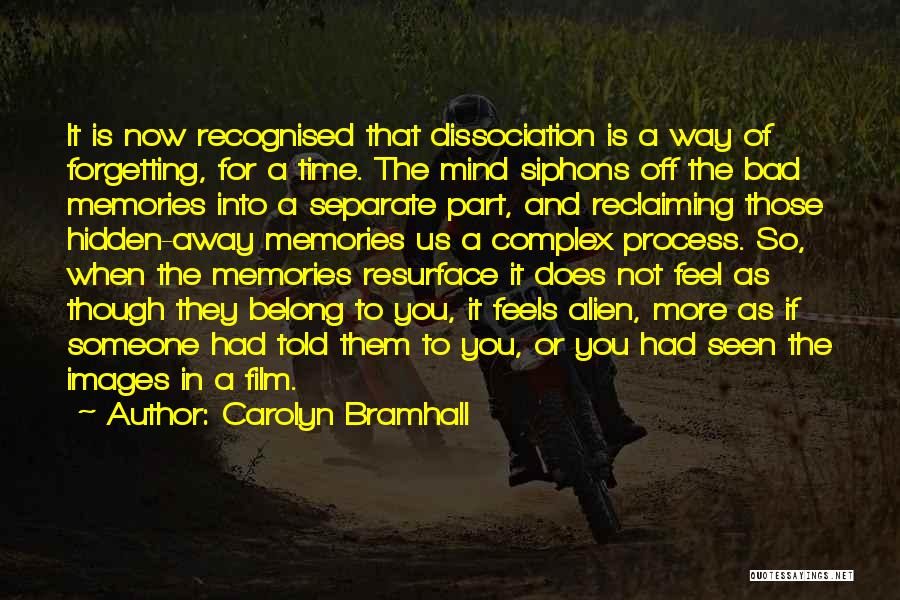
It is now recognised that dissociation is a way of forgetting, for a time. The mind siphons off the bad memories into a separate part, and reclaiming those hidden-away memories us a complex process. So, when the memories resurface it does not feel as though they belong to you, it feels alien, more as if someone had told them to you, or you had seen the images in a film. — Carolyn Bramhall
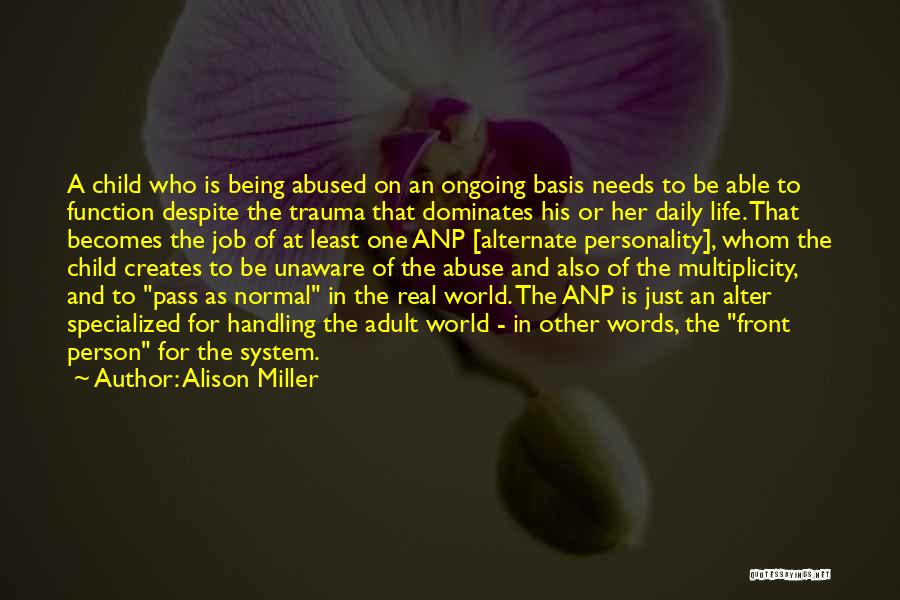
A child who is being abused on an ongoing basis needs to be able to function despite the trauma that dominates his or her daily life. That becomes the job of at least one ANP [alternate personality], whom the child creates to be unaware of the abuse and also of the multiplicity, and to "pass as normal" in the real world. The ANP is just an alter specialized for handling the adult world - in other words, the "front person" for the system. — Alison Miller
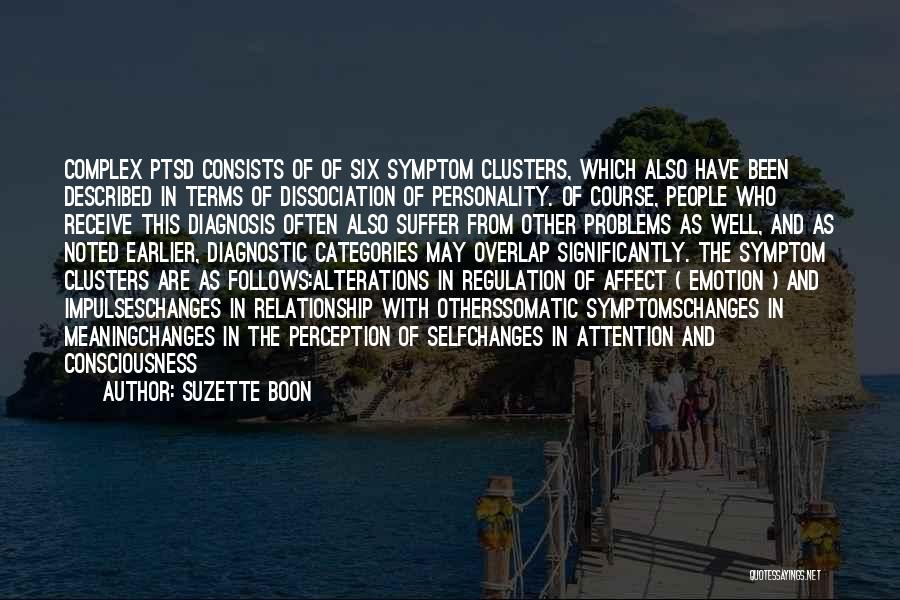
Complex PTSD consists of of six symptom clusters, which also have been described in terms of dissociation of personality. Of course, people who receive this diagnosis often also suffer from other problems as well, and as noted earlier, diagnostic categories may overlap significantly. The symptom clusters are as follows:
Alterations in Regulation of Affect ( Emotion ) and Impulses
Changes in Relationship with others
Somatic Symptoms
Changes in Meaning
Changes in the perception of Self
Changes in Attention and Consciousness — Suzette Boon
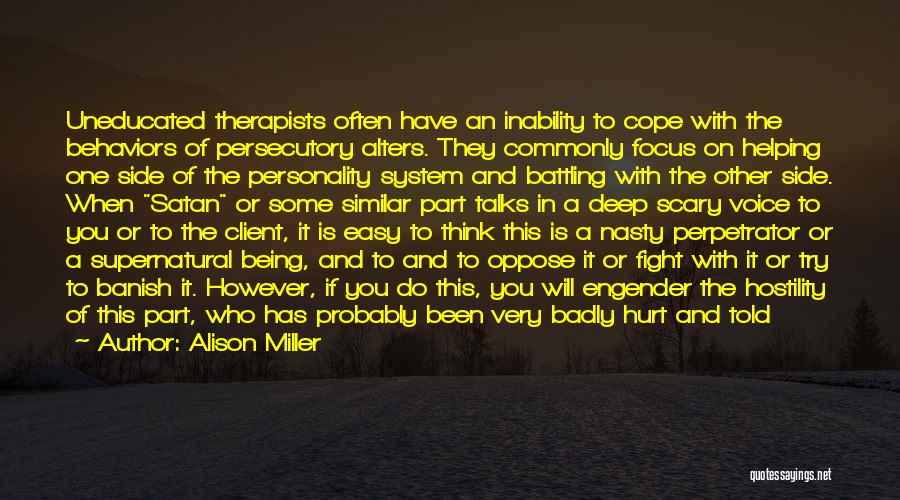
Uneducated therapists often have an inability to cope with the behaviors of persecutory alters. They commonly focus on helping one side of the personality system and battling with the other side. When "Satan" or some similar part talks in a deep scary voice to you or to the client, it is easy to think this is a nasty perpetrator or a supernatural being, and to and to oppose it or fight with it or try to banish it. However, if you do this, you will engender the hostility of this part, who has probably been very badly hurt and told a lot of lies. You will foster internal splitting in this way, and get nowhere fast.
Once you recognize that these alters have a protective intent, you can see that working with them involves enlisting them in the service of healing, just as they were originally enlisted in the cause of safety. You will see examples of these kinds of errors, which often result in clients leaving their therapists, in survivor LisaBri's story: When therapists make mistakes. — Alison Miller
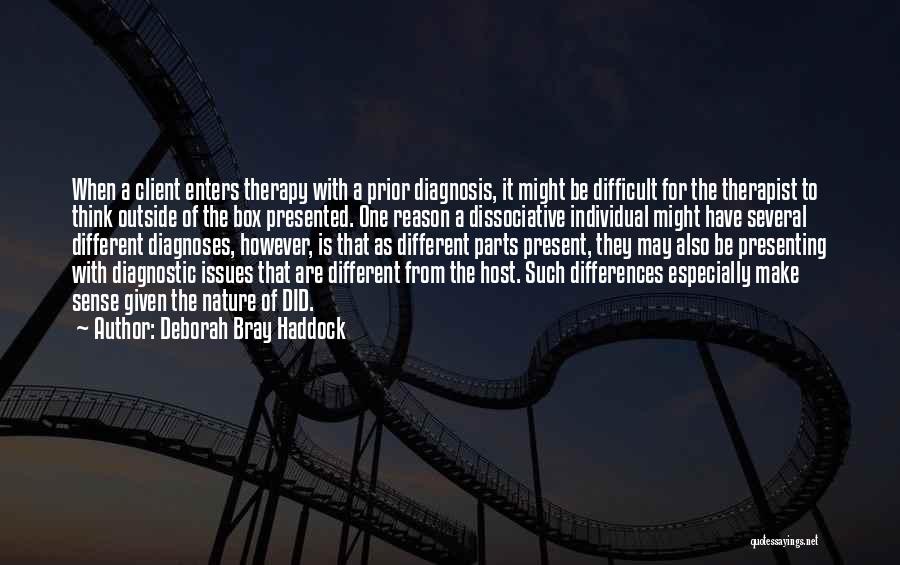
When a client enters therapy with a prior diagnosis, it might be difficult for the therapist to think outside of the box presented. One reason a dissociative individual might have several different diagnoses, however, is that as different parts present, they may also be presenting with diagnostic issues that are different from the host. Such differences especially make sense given the nature of DID. — Deborah Bray Haddock

The general public is bewildered and fascinated by Multiple Personality Disorder/Dissociative Identity Disorder. Through books, television and movies, a distorted view of MPD/DID is often presented. While it may make for good entertainment, it fails to truly present the depth and intensity of the inherent trauma. Outside the ordinary day-to-day life experience of most people, it is hard to understand. — David Yeung
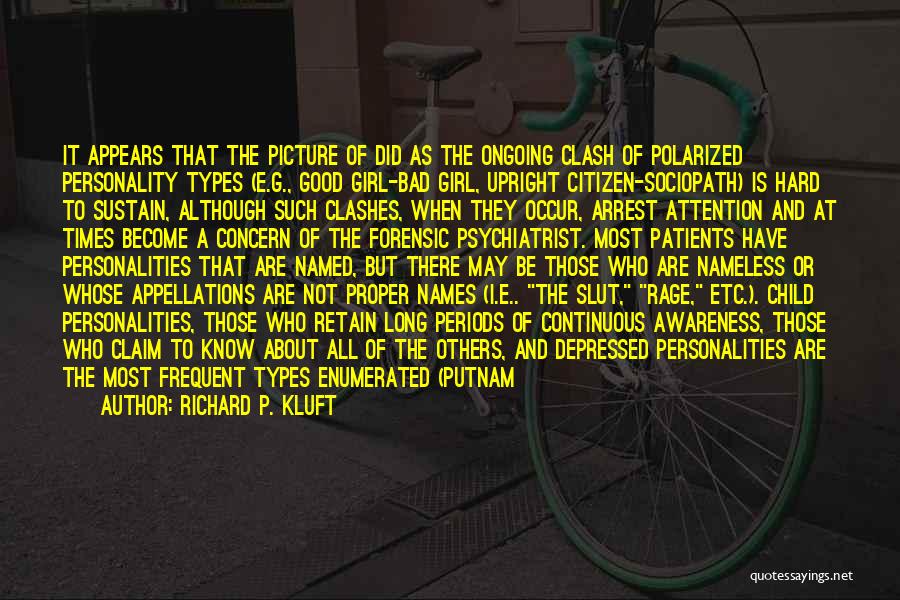
It appears that the picture of DID as the ongoing clash of polarized personality types (e.g., good girl-bad girl, upright citizen-sociopath) is hard to sustain, although such clashes, when they occur, arrest attention and at times become a concern of the forensic psychiatrist. Most patients have personalities that are named, but there may be those who are nameless or whose appellations are not proper names (i.e.. "the slut," "rage," etc.).
Child personalities, those who retain long periods of continuous awareness, those who claim to know about all of the others, and depressed personalities are the most frequent types enumerated (Putnam et al.. 1986). — Richard P. Kluft
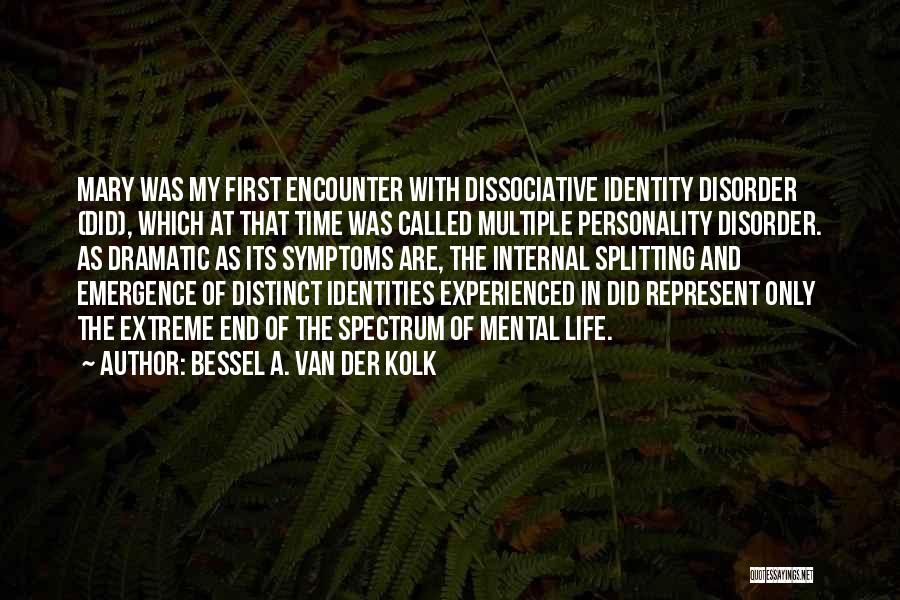
Mary was my first encounter with dissociative identity disorder (DID), which at that time was called multiple personality disorder. As dramatic as its symptoms are, the internal splitting and emergence of distinct identities experienced in DID represent only the extreme end of the spectrum of mental life. — Bessel A. Van Der Kolk
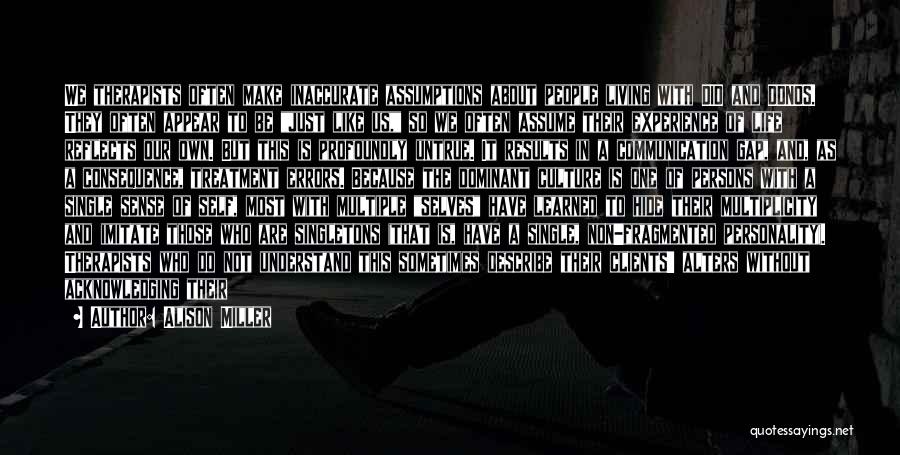
We therapists often make inaccurate assumptions about people living with DID and DDNOS. They often appear to be "just like us," so we often assume their experience of life reflects our own. But this is profoundly untrue. It results in a communication gap, and, as a consequence, treatment errors. Because the dominant culture is one of persons with a single sense of self, most with multiple "selves" have learned to hide their multiplicity and imitate those who are singletons (that is, have a single, non-fragmented personality). Therapists who do not understand this sometimes describe their clients' alters without acknowledging their dissociation, saying only that they have different "moods." In overlooking dissociation, this description fails to recognize the essential truth of such disorders, and of the alters. It was difficult for me to comprehend what life was like for my first few dissociative clients. — Alison Miller
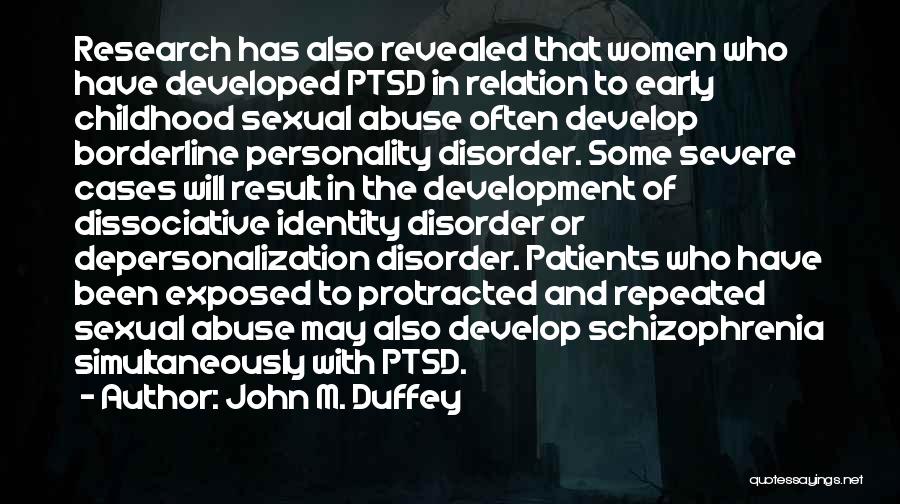
Research has also revealed that women who have developed PTSD in relation to early childhood sexual abuse often develop borderline personality disorder. Some severe cases will result in the development of dissociative identity disorder or depersonalization disorder. Patients who have been exposed to protracted and repeated sexual abuse may also develop schizophrenia simultaneously with PTSD. — John M. Duffey
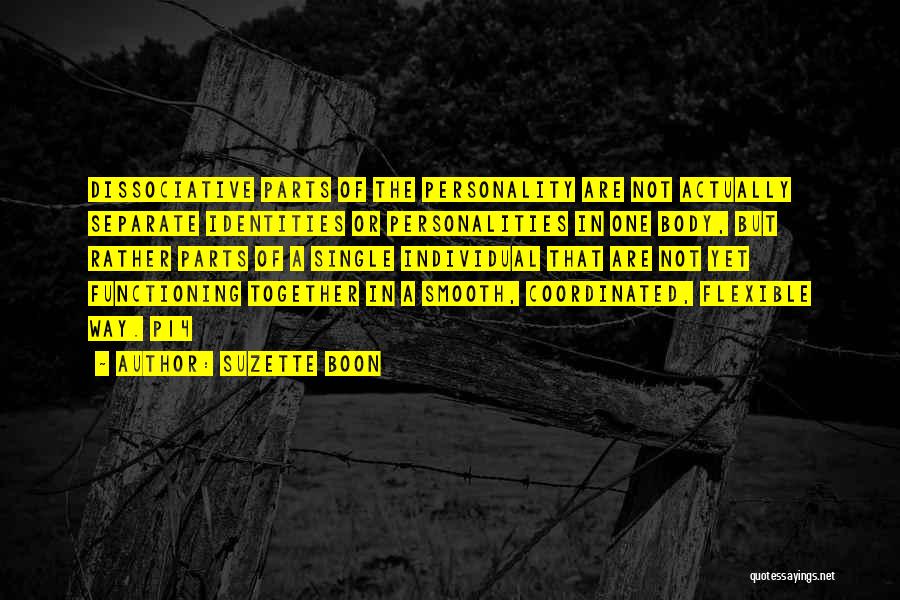
Dissociative parts of the personality are not actually separate identities or personalities in one body, but rather parts of a single individual that are not yet functioning together in a smooth, coordinated, flexible way. P14 — Suzette Boon
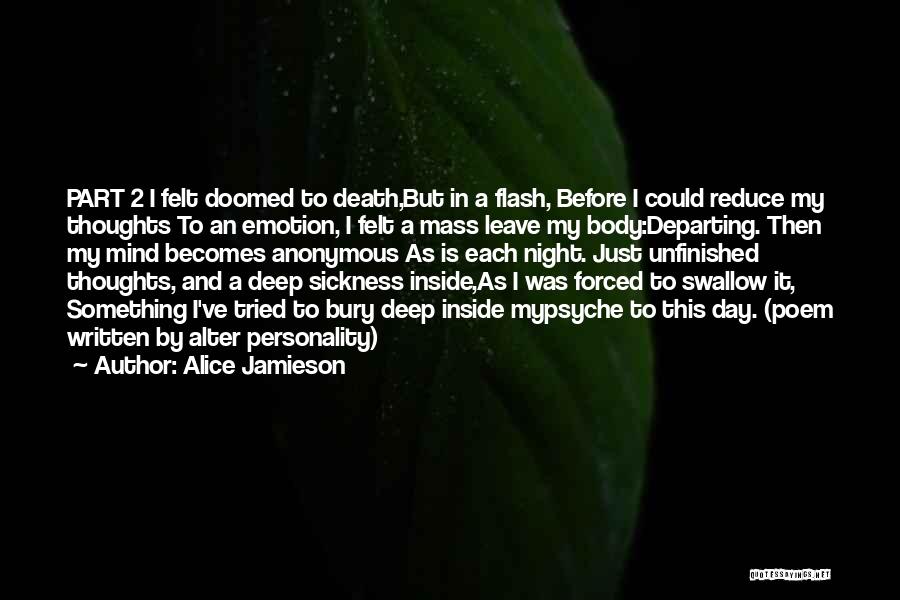
PART 2
I felt doomed to death,
But in a flash,
Before I could reduce my thoughts
To an emotion,
I felt a mass leave my body:
Departing.
Then my mind becomes anonymous
As is each night.
Just unfinished thoughts,
and a deep sickness inside,
As I was forced to swallow it,
Something I've tried to bury deep inside my
psyche to this day.
(poem written by alter personality) — Alice Jamieson





